#because following what another post suggested I decided to change the language to German
Text
:D
:D
:D
:D
:D
I GOT TALE OF TWO TOWNS TODAY
LET’S GOOOOOOOOOOOOOOOOOOOOOO
I’d play it right now but also it’s near 12am and I have work soooooooooooooooooooo TOMORROW
but omg I’m so excited because f l o w e r f a r m I WILL HAVE MY OWN FLOAROMA TOWN AND EEEEEEEEEEEEEEEEEEEEEEEEEEEEEEEEEE
aside from that, I also have chuppa chups :D very happy right now
#EEEEEEEEEE#squir spiels#I CAN'T BELIEVE IT'S COME ALREADY#bruh I got a package yesterday and thought it was the game but nooooo#it was clothing#which was good but also GAMES#I WANTED THE GAME#they said it'd deliver yesterday or smth but ehhh#I GOT IT NOW#so happy#one more day for this week and then long weekend wooooo#Floaroma Ranch time >:D#as a sidenote#I've been thinking about starting something of a blog/fic all to do with my current playthrough of fomt#because following what another post suggested I decided to change the language to German#and boy has it been fun#so far my story is I'm a person with a German Grandad and he left me his ranch#seeing as I only visited in the Summer I gradually picked up more English and forgot my German which makes for some interesting conversation#(or lack thereof) with the rest of the town#Thomas must be very confused by my not understanding him#or why I'm nodding and sweating so much#I say I'll write a blog/fic for this but here I am detailing it all in the tags XD#I'M INSPIRED AND MOTIVATED TO DO THIS NOW#but also I have work so um later
0 notes
Photo

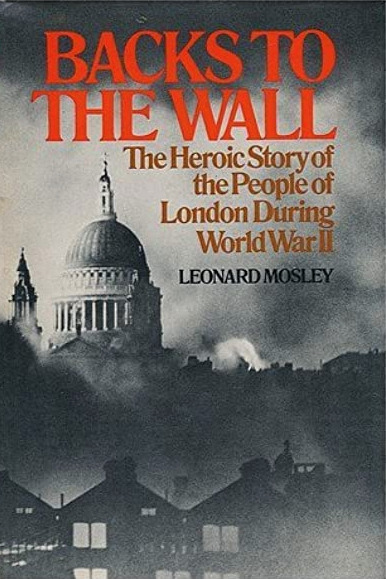
Mosley, Leonard. Backs to the Wall: London Under Fire, 1939-1954. London: George Weidenfeld & Nicolson, 1971; reprint, as Backs to the Wall: The Heroic Story of the People of London During World War II, New York: Random House, 1971.
Each generation gets the history that it needs — or wants, or demands. That’s what kept going through my head as I read Backs to the Wall, which appeared three years after France’s youth explicitly rejected both Charles de Gaulle, the self-appointed leader of the Free French during World War II, and the political ideology that he represented, and amidst ongoing unrest over the Vietnam War. (It’s also worth mentioning that it was published in the same year as Norman Longmate’s How We Lived Then: A History of Everyday Life During the Second World War and two years after Angus Calder’s The People’s War.) This book gives up a World War II narrative in which Churchill was an improvement on Chamberlain only in that he wasn’t an appeaser, de Gaulle was worse than both of them put together, the Allied leaders all cordially loathed each other, half the British public wanted to sue for peace, and there was across-the-board mutual dislike between London civilians and American troops (and British dismay at the way African-American troops were treated by their white counterparts was far from universal). Do I exaggerate? Only slightly. Backs to the Wall is a sort of distant, city-specific pre-echo of Juliet Gardner’s sour 2004 book Wartime: Britain, 1939-45.
As with Wartime, however, this book does have the virtue of introducing us to a number of very interesting people. I became interested in reading it because it brought Vere Hodgson’s wartime diary to public attention. Mosley quotes or paraphrases Hodgson’s writing from the beginning of the war through its end, and also seems to have interviewed her extensively. His primary villain, meanwhile, is not Chamberlain but Chamberlain’s chief acolyte, Henry “Chips” Channon, from whose diary he quotes widely (and who turns out to have been born and raised in the United States, to my surprise). We hear a great deal from the chemist and novelist C.P. Snow and follow the misadventures of two civilians, Jenny Martin and Polly Wright, whose consistency in both bad luck and bad choices meant that neither of them was able to stay out of serious trouble for any length of time.
There are many glimpses of the London home front through the eyes of two boys, both eight when the war began: John Hardiman, of Canning Town and later of Aldgate, who was evacuated in 1939 but soon returned to London, and Donald Ketley of Chadwell Heath, who was never evacuated at all. Donald, who thoroughly enjoyed himself during the war, had an experience that speaks to our own recent reality:
Another good thing: quite early in the Blitz, his school had been totally destroyed by a bomb. Since Donald was shy, a poor student and unpopular with his teacher, he was overjoyed when he heard the place was gone. Thereafter he went each day to his teacher’s home to pick up lessons, which he brought back the next day for marking. In the following months he changed from a poor student to an excellent one, and although he was aware that his teacher rather resented it, he didn’t care.
Mosley also introduces us to Archibald McIndoe, the real-life counterpart of Patrick Jamieson, Bill Patterson’s character in the Foyle’s War episode ‘Enemy Fire.’ Art seems to have imitated life pretty accurately in that instance: he and his burn hospital in East Grinstead were apparently exactly like what was depicted, the only difference being that the hospital was set up in an existing hospital building, not in a requisitioned stately home.
Backs to the Wall seems to have been one of the earliest books to make substantial use of Mass-Observation writings. Most M-O diaries are anonymous, but there are two named diarists here who stand out. John James Donald was a committed pacifist whose air of lofty detachment as he observes the reactions of those around him to air-raids and other wartime event and prepares for his tribunal — which, in the end, he decides not to attend — quickly grows irritating. More interesting is Rosemary Black, a 28-year-old widow, in no small part because she differs markedly from what I had thought of as the archetypical M-O writer. Here’s her self-description on M-O documents: “Upper-middle-class; mother of two children (girls aged 3 and 2); of independent means.” Mosley continues:
She lived in a trim three-story house in a quiet street of the fashionable part of Maida Vale, a short taxi ride from the center of the West End, whose restaurants and theatres she knew well. She was chic and attractive, and lacked very few of the niceties of life: there was Irene, a Hungarian refugee, to look after the children; Helen, a Scottish maid, to look after herself and the house; and a daily cleaning woman to do the major chores.
Black took her children out of London at the beginning of the war but quickly brought them back, and when bombs began falling she kept them in place — air raids might be disruptive for them, but apparently relocation had been worse. She was very much aware that she was riding out the war in a position of privilege, and she often expressed guilt feelings; but this tended to fade away before her irritation at the dominance of “the muddling amateur or the soulless bureaucrat” in the war effort. Offering her services, even as a volunteer, proved very frustrating. “She was young, strong and willing; she typed, spoke languages, was an expert driver and had taken a course in first aid,” Mosley tells us, “but finding a job even as a chauffeur was proving difficult” in September 1940. (She actually wasn’t all that strong physically: as we learn, she suffered from rheumatism which grew worse during the war years and probably affected her outlook.)
Black was greeted with “apathy and indifference” by both A.R.P. and the Women’s Voluntary Service. Early in 1941 she was finally able to get a place handing out tea, sandwiches, cake, and so on to rescue and clean-up workers at bomb sites from a Y.M.C.A. mobile canteen. She was a bit intimidated by the women with whom she found herself working:
Their class is right up to the county family level. Nearly everyone is tall above the average and remarkably hefty, even definitely large, not necessarily fat but broad and brawny. Perhaps this is something to do with the survival of the fittest.
And the work did bring her some satisfaction, even if it was of the type that lent itself to being recorded with tongue placed firmly in cheek:
We had a pleasant and uneventful day’s work serving City fire sites, the General Post Office, demolition workers and Home Guard Stations, etc. We were complimented at least half a dozen times on the quality of our tea ... I think the provision of saccharine for the tea urns to compensate for the mean sugar allowance is my most successful piece of war work. What did you do in the Great War, Mummy? Sneaked pills into the tea urns, darling.
For all her good humor and astute observations, Mrs. Black was far from immune to tiny-mindedness. After an evening out in 1943 she wrote:
I had to wait some time for the others in the cinema foyer, and I was much struck, as often before, by the almost complete absence of English people these days, from the capital of England. Almost every person who came in was either a foreigner, a roaring Jew, or both. The Cumberland [Hotel] has always been a complete New Jerusalem, but this evening it really struck me as no worse than anywhere else! It is really dismaying to see that this should be the result of this war in defence of our country.
Indeed, Mosley cites the results of a multi-year Mass-Observation study that showed a marked increase in anti-Jewish views London’s general population over the course of the war. Since it’s just one study, and since I haven’t seen that study mentioned anywhere else, I am reluctant to trust blindly in its accuracy; and there’s also this:
The small flat which George [Hardiman] had procured for [his family] ... in Aldgate was cleaner and airier than the old house in Canning Town [which had been bombed], and the little Jewish children with whom John now went to school seemed to be cleaner than the ones in Elm Road; at any rate, he no longer came home with nits in his hair.
On the other hand, Mosley himself gives us only a fragmentary view of London’s wartime Jewish population: everyone seems to be either a terrified refugee or an impoverished East Ender. We hear nothing about the substantial middle- and upper-middle class population — mostly of German descent and in some cases German birth — that had already taken shape in Northwest London; and while we are briefly introduced to Sir David Waley, a Treasury official, in connection with the case of an interned Jewish refugee, we aren’t told that Waley himself was Jewish, a member of “the cousinhood.” On yet a third hand, Mosley also quotes other M-O surveys from the same period that indicate largely hostile attitudes to most foreigners in London, with Poles at the bottom of the ladder and the small Dutch contingent on top. (Incidentally, the book’s extremely patchy index identifies Vere Hodgson as a Mass-Observation diarist, which she wasn’t.)
Backs to the Wall closes with a very brief, remarkably non-partisan account of the 1945 general election and its immediate aftermath. “Neither side had any inkling of the way the minds of the British voters were turning,” he writes.
When [Churchill’s] friends suggested that he was a victim of base ingratitude, he shook his head. He would not have such a charge leveled against his beloved countrymen. Ingratitude? "Oh, no," he said quietly, "I wouldn’t call it that. They have had a very hard time."
The book is worth reading for the primary materials that it includes, but it probably tells us as much about the era in which it was written as about the period that it covers.
#world war II#u.k. home front#london#non-fiction after the fact#recommended with reservations#long post
2 notes
·
View notes
Text
A Visitor
Chapter 11

[Nøkken by Theodor Kittelsen]
"Inga," Frederick called out from the corridor, catching up to his sister just before she walked outside, "I didn't see you when I was studying today."
"Oh…" she shrugged as she opened the door, "I got a lot done yesterday and Monday, so the tutors told me to take today off."
He followed her out the door."So did you?" he asked, blinking at the sudden sunlight, “take a day off?”
"You didn't see me," she remarked, looking over her shoulder, "Does that answer your question?"
"Right, I guess so," he nodded, walking ahead a bit before turning around. "Speaking of Monday… Did you hear anything else about that meeting they were having?"
"I never heard anything about that," Inga admitted, "but I imagine if anything… important… was decided, they'll tell us. I was actually helping Mama with correspondence today, and I tried to bring it up, but she didn't think there was anything worth telling me..."
"You do that a lot, don't you? Writing letters for her?"
"I'm sure she'd let you help if you asked. It's not usually that difficult. You always write if someone is born or dies or gets married, and be sure to write in the correct language…"
"That's mostly French or German, I'd imagine. Maybe some English?"
"Count Esterhazy still writes exclusively in Latin."
"You can keep that one," Frederick laughed.
Frederick and Inga sat down on a bench at the edge of the garden. They could hear Anton and Peder somewhere nearby.
"Should they be doing that?" Inga asked, listening to their laughing and shouting.
"I can't see them, and I have no idea what it is, but they probably shouldn't be," Frederick admitted.They heard Nanny scolding them, and Sofia repeating whatever Nanny said, for good measure. The twins soon came around the corner, looking dejected.
"Where's that friend of yours?" Peder asked.
"You mean Lars?" Frederick replied, "I haven't seen him today."
"Too bad," Anton said as he kicked at the dirt. "I like him, even if he does have silly hair."
"What's silly about his hair?" Inga asked. "It's not that different from yours, you know."
"Oh, I didn't mean the color, just the mustache. I don't have one of those, at least."
"And you won't for a long time," his sister told him.
"Won't what?" Lars inquired, approaching them from the direction of the courtyard.
"Oh, nothing important, just something silly they were talking about," Inga said quickly.
Frederick laughed loudly. Inga shot a glare at him, raising her eyebrows.
"Um, well, obviously I missed some inside joke, but that's fine," Lars shrugged.
"Oh, no, we were actually just talking about you," Peder informed him.
"Really?" Lars blanched. "Nothing bad, I hope?"
"No, nothing bad," assured Peder, "except Anton doesn't like your mu… oof!" Anton had elbowed his brother sharply.
"I think neither of you gets to talk for the next hour," scolded Frederick, trying not to laugh more.
"I have a brother, you know," laughed Lars, "so I think I can handle whatever it was."
"That doesn't mean they should be talking about people we barely know," Inga interrupted, looking at her brothers. Frederick, at least, was trying to behave. The twins were both standing on the other bench, discussing the merits of climbing over the wall.
Having nowhere to sit, Lars leaned against the nearby tree. Nanny had started an English singing game in another corner of the garden with Sofia and Marie.
"Is your nanny English?" Lars asked.
"No," answered Inga, "she just likes that song. I don't know why. It's a pretty melody, but the lyrics are actually rather morbid when you know what they mean… at least, that's what Vicky told me when they were visiting here."
"Oh, you mean the one from England?" Lars half asked.
"Yes, it was a while ago, but I kept in touch with her for a few years. Less so since she got married."
"I didn't mind that visit," Frederick added, "but I wish that their father hadn't been so obvious about his matchmaking interests. My German might not be as good as it should be, but I could tell what he was talking about, though I guess at least Louise is about my age."
"Mr. Meyer… the ambassador, I mean…” Lars clarified. “He was posted in Belgium for several years, where he got to know the king. If you think the father of your English friends was blatant, his uncle is far worse. I think Mr. Meyer has been hoping to perform the same sorts of services for you and… well..." he trailed off, knowing that was a sensitive subject.
"It's sad about their father, though," interrupted Inga. "I wrote to Vicky when I heard about it. She sent something back, but I'm not really sure if she wrote it herself. Not that I can blame her."
"Oh, yes," gasped Lars, "that was quite shocking. I mean, my father is dead, but I never knew him, so it doesn't bother me in the same way. I imagine it would be far worse--"
"Can we not talk about this?" Frederick asked, trying to sound bored instead of distressed after having done some quick mental calculations about their own father's age.
Lars stood by the bench awkwardly, and Inga sat for a while looking at Sofia and Marie dancing around in the distance, with little Karl pretending to keep up. Peder and Anton started climbing the nearest tree a dozen feet away. Frederick walked over to the tree and tested which branches he could reach while standing on the ground.
"Can I ask you something, Lars?" Inga inquired earnestly.
"I suppose?"
"Did your mother ever consider marrying again?"
"Um… I never thought about that. She was always so focused on the two of us, and the only other person she ever talked about was our father. Even if she had thought about it, we weren't from around there, you know."
"Well, that shouldn't make a difference," Inga sighed, "and people move to Corona from elsewhere all the time, I heard you say that yourself."
"I guess she just kind of kept to herself. Even when we had people visiting, she just wasn't very social."
"Sorry," Inga apologized, "I didn't mean to pry or anything."
"Don't worry about it," he assured her, "to change the subject, I actually came over here just now because I got a letter from my brother this morning, and they'll be arriving this week, and I thought you'd all like to meet him."
"Just your brother?" Inga asked pointedly.
"Well, all of them, including Elizabeth. I got the idea from my brother's letter that they hadn't told her about the change of itinerary, otherwise she'd have written to me first, I'm sure."
"Where were they originally going?" Frederick asked, sitting in the middle of the roots of the tree across from them. Neither Inga nor Lars had noticed him listening to their conversation.
"Various places. The Southern Isles is the big one they're skipping. That's a little worrisome, since things had been quite amicable for a while…" Lars stopped himself, "and that's probably something you should forget I said."
Inga laughed. "I don't think you'll need to worry.”
Frederick frowned at her.
"Who's Elizabeth?" Peder asked, hopping down from his tree branch.
"His fiancee," Inga answered quickly.
Lars looked over at her, but she was suddenly engrossed in looking over at the younger children at the far end of the garden.
"Yes," Lars replied, "I haven't seen her in over a month now."
"Did you get any letters from your mother?" Inga asked.
"Not since I last wrote a few days ago, but of course there's been no time for that to reach her yet, even if there were a steamship available."
"Why can't she get the letter sooner?" Peder demanded.
"Hush, Peder," Inga scolded him.
"But why not?" he whined.
"Perhaps getting a regular steamship from here would be useful," Lars replied.
"That's not what I… oof, Inga! Stop that!" Peder protested as his sister kicked him in the shin.
"Why don't we go on a ride?" Anton suggested. The others readily agreed. Inga went over to tell Nanny where they were going, and caught up to the others as they slowly walked to the stables. Frederick proudly mentioned that he had brought money with him, so they could have lunch in town on their way back. They tacked their horses, and set off from the castle.
As they left town, heading up the hill, Inga looked out over the fjord and thought she saw something at the horizon on the water.
"Stop!" she shouted, pulling up even with Frederick. "Fred, look!"
"Oh, I was starting to wonder when she would get here!" Frederick laughed, "let's go back!"
Anton and Peder quickly followed him down the hill, and Inga started to follow, then rode back to Lars when she realized that he hadn't moved.
"What is it?" Lars asked as she approached.
"What is it?" Inga repeated sternly, "We've all turned around and you're just staying there. You don't have to come with us, but I don't want to be rude and leave you here…"
"No, I mean…" Lars began, but Inga was riding away back down the hill quickly to try to catch up with her brothers.
Inga caught up with her brothers just as they were entering the castle gates. A stable boy had run out just before she arrived, so they left their horses with him and ran through the castle and down through the side door to the fjord.
The twins were first out to the shore. Inga had caught up with Frederick and he let her go outside first. The sun was almost blinding on the water.
“Aunt Elsa!” the boys shouted, running out into the water as Elsa dismounted the Water Nokk and it dissolved into the fjord with a bow. Inga stood back and smiled. Her aunt always took time with her, so there was no need to push in on her brothers. There was a lot of noise about how long it had been, and how much they had grown, and debate with Frederick as to whether he was taller than his father yet, and the boy insisting he was still only as tall as his sister.
After the noisy greetings died down a little, the group walked up the steps and back to the courtyard. Inga let them all through the door, and walked along behind them. She noticed Lars up ahead giving his horse to the stable boy, looking around seeming somewhat confused. Elsa noticed him, too, and stopped.
“Who’s this?” she asked.
“Oh,” Inga ran up to her aunt’s side, “this is Lars, he’s from Corona. He’s the private secretary to the new ambassador.”
“We’re keeping him entertained until his work starts,” Frederick added.
“Corona…” Elsa mumbled under her breath, still staring at him.
Lars blinked, realizing who he was looking at, and bowed silently, too stunned to remember the protocol he had learned.
“Oh,” Elsa smiled nervously. “Please, you don’t need to do that. What's your name again?”
He stood up quickly enough to feel a bit dizzy, and repeated his well-rehearsed line, “Lars Nilsen, private secretary to the ambassador from Corona.”
“Nilsen…” Elsa said slowly, “and you’re from Corona?”
“Yes, but my parents were originally from Arendelle,” he replied.
“They left before he was born,” Frederick added, desiring to be helpful, “and his father died before he was born, and he’s been asking around seeing if anyone around here remembers them.”
“Fred, I don’t think she needs to know all that,” Inga cut in. Her brother glared at her for using the nickname.
“Your mother was Margit Nilsen?” Elsa asked, ignoring her niece’s interruption.
“Yes,” Lars’ jaw dropped in surprise, “I wouldn’t have expected… she only ever says good things about you, but I had no idea you would remember her.”
“I…” Elsa paused when she caught Inga staring at her. “I hope she’s doing well.” Elsa quickly turned her attention to the nanny bringing over the younger children from the garden.
"What was that?" Inga whispered to Frederick, who simply shrugged and followed his aunt.
10 notes
·
View notes
Text
Axel Scheffler
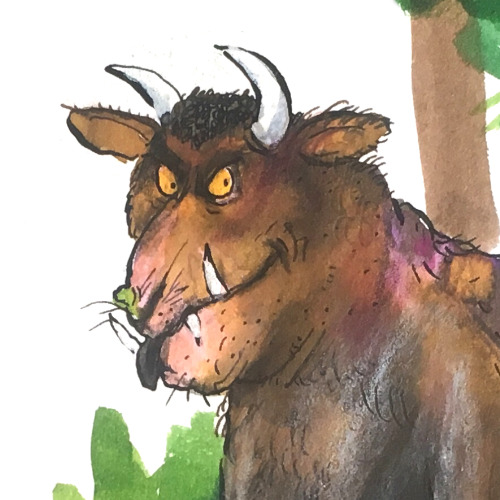
In this post, Axel takes us on a journey through his art studio and career. As well as sharing wonderful development work from some of his much-loved picturebooks, he shows us unseen sketchbook pages, early illustration commissions, etchings he made as a student, and his recent work to educate children about the coronavirus.
Visit Axel Scheffler’s website
Axel: I’m not really sure how many books I’ve illustrated in the 30+ years that I’ve been working. Over 150. I mostly work for the UK market, but occasionally I do books with German publishers. Not picturebooks though, so nothing that collides with the co-edition market.
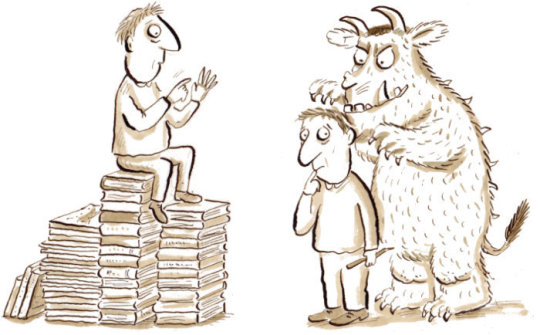
Each of the boxes you see here contains one of my books: the sketches, illustrations, dummies, alternate versions of covers, everything.
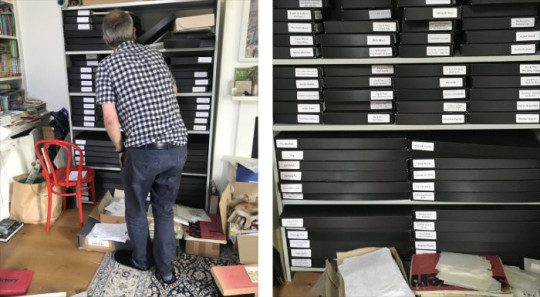
I organised these boxes with Liz, my assistant, to have all the main books there so we can find things for exhibitions. There’s still lots of drawings in these boxes which aren’t sorted yet. Liz is such a great help, but it’s very difficult for me to keep on top of everything. I think I would probably need two Lizes, or perhaps three.
So yes, I don’t really know where to begin... I’ve got endless sketchbooks and little drawings on paper. I’ve got some really old sketchbooks I could show you.
Shall we start with The Gruffalo?
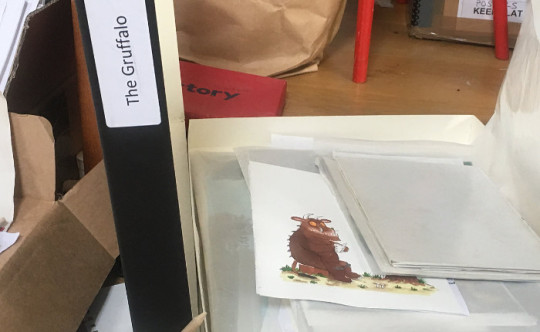
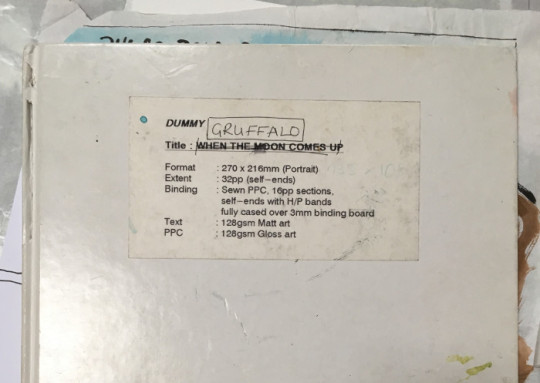
My early sketches of the Gruffalo were thought by my editor to be too scary for small children. So I had to make him a bit rounder and more ‘cuddly’. Initially, I‘d also thought that all the animals would be wearing clothes, as they often do in picturebooks. But Julia had different ideas, and to be honest I was relieved. How would I have dressed the snake?
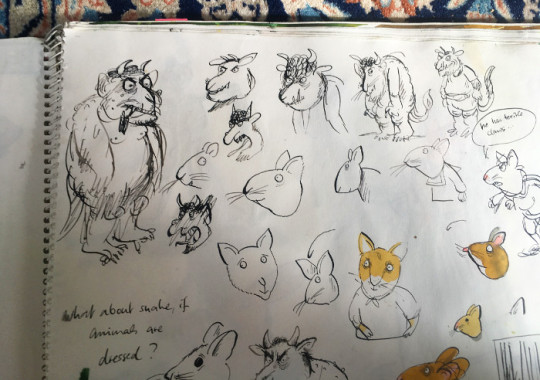
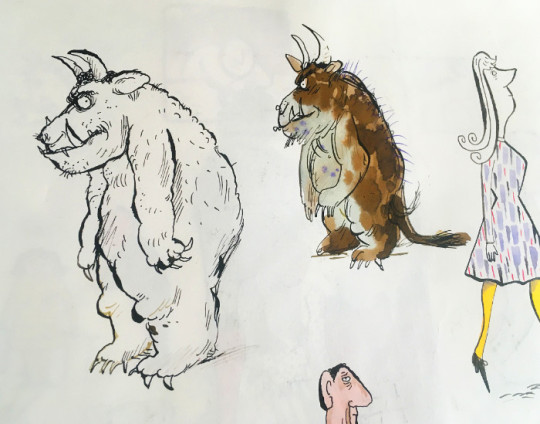
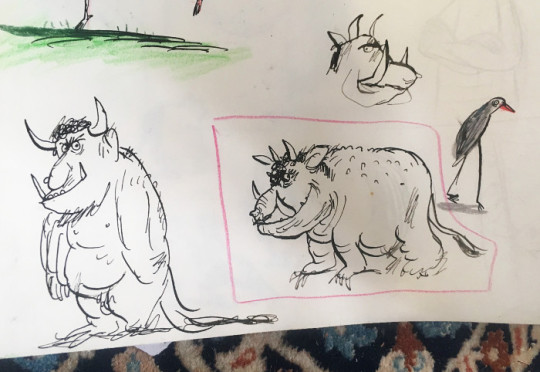
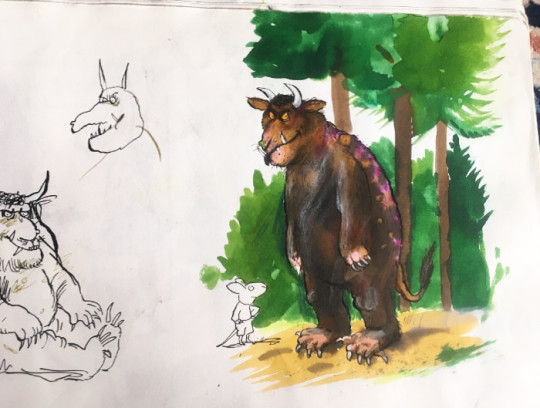
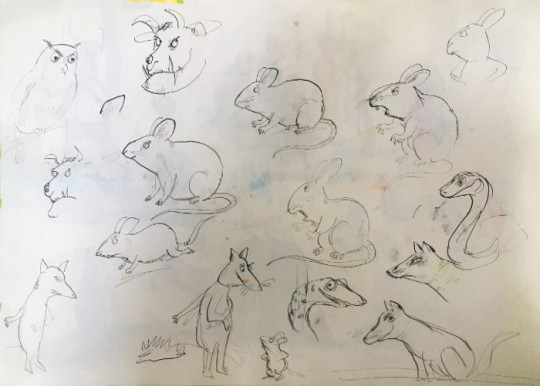
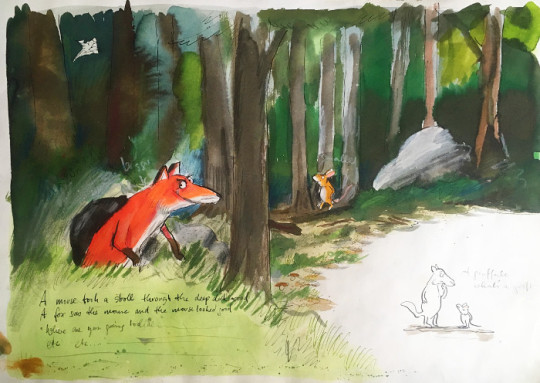
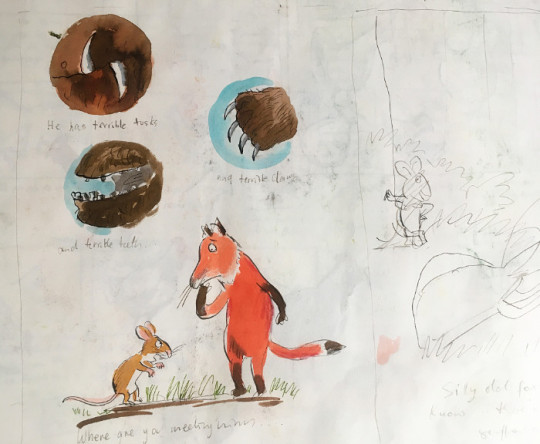
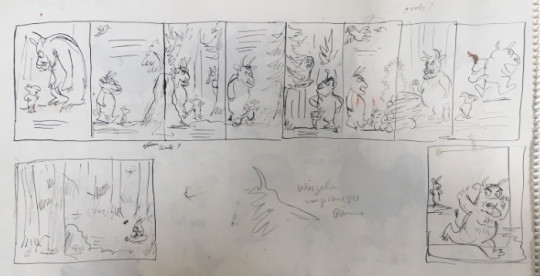
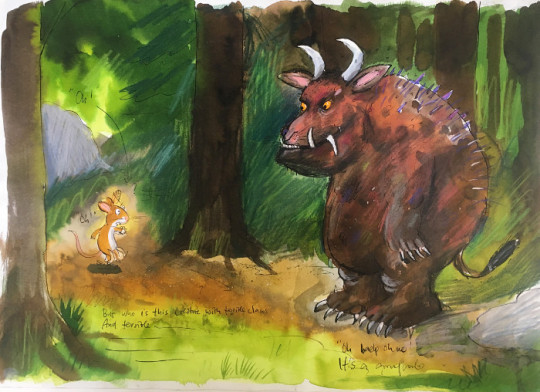
Here’s some spreads from the dummy...
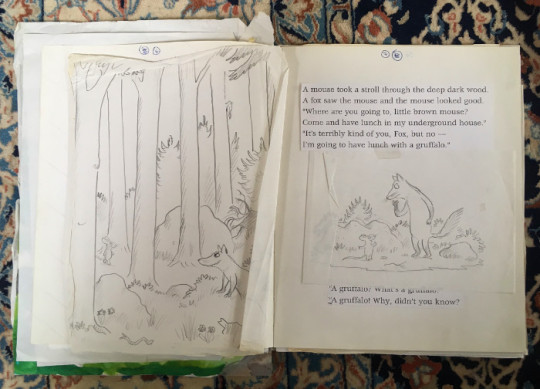
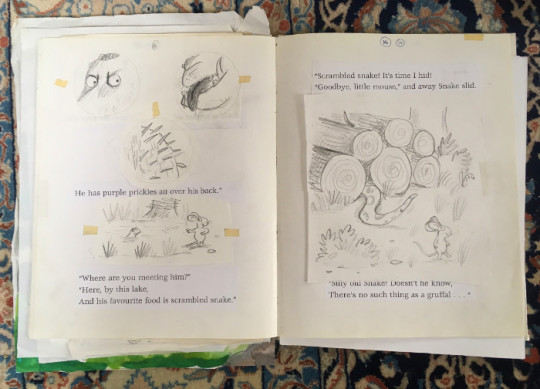
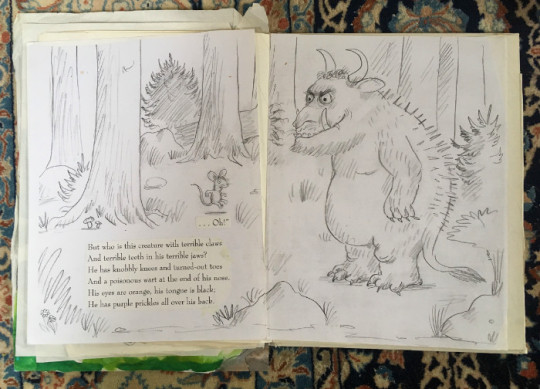
I tried a lot of alternate covers for this book; I think there were twelve in total. There’s some where the Gruffalo doesn’t even feature on the cover.
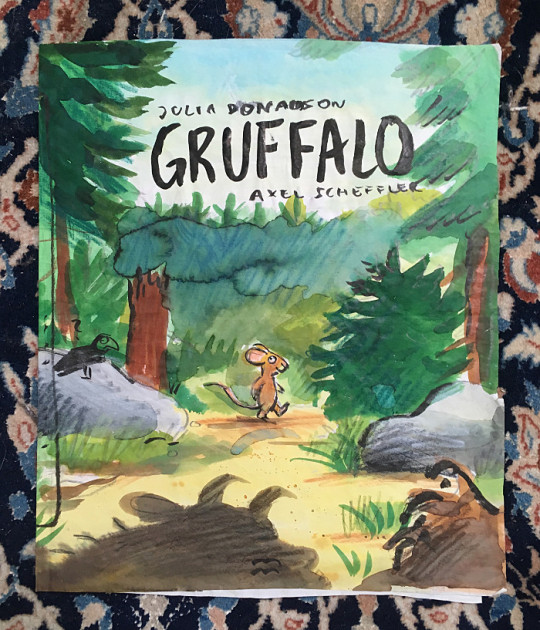
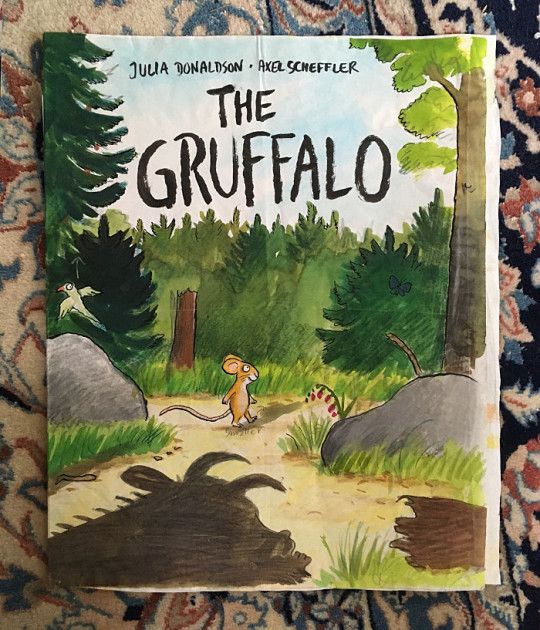
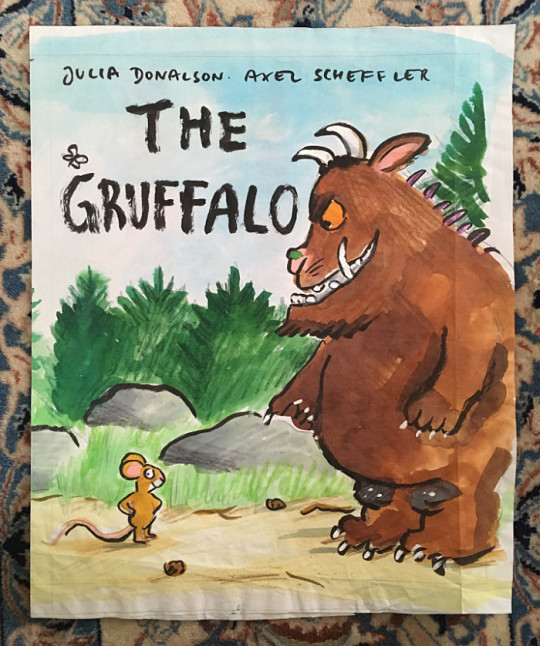
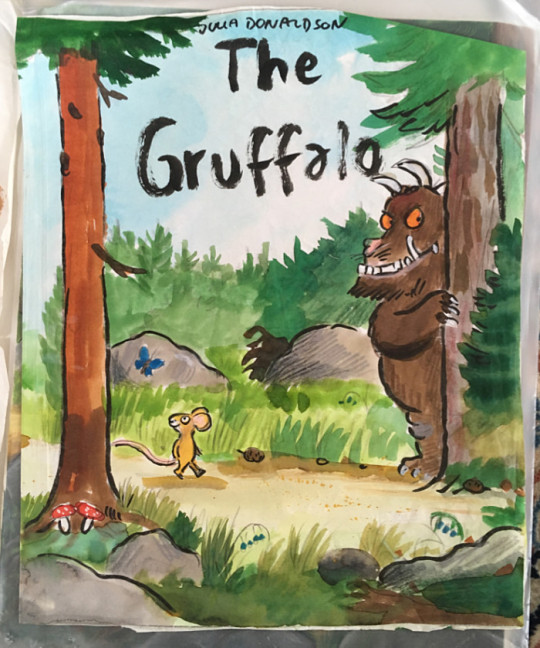
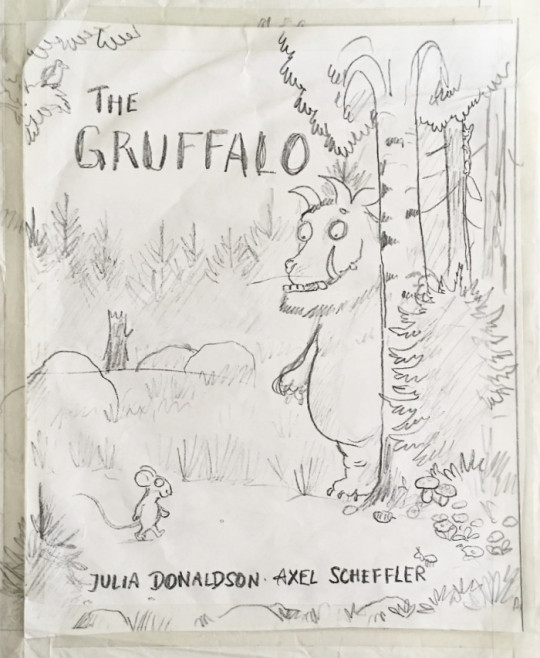
My latest book with Julia is called ‘The Smeds and The Smoos’. It was quite nice to work on because it’s so different from the other books we’ve done together. The text is a bit like a mixture between Dr Seuss and Lewis Carol; it has this nonsense element. But it’s basically Romeo and Juliet in outer space.
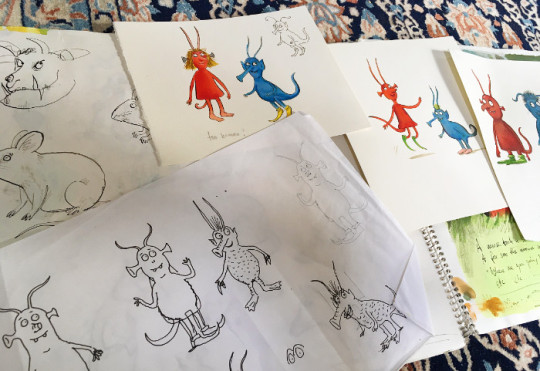
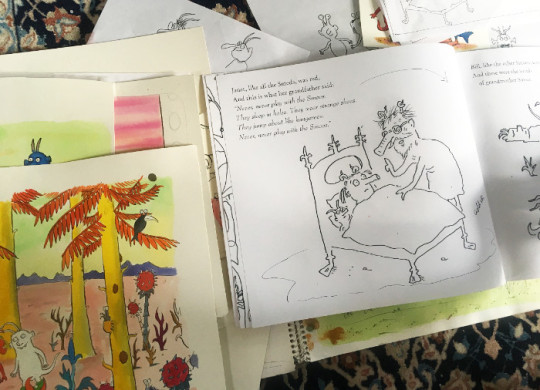
It’s an alien story, so I didn’t have to draw any rabbits or squirrels for a change, and I could invent more. I had more freedom. But like always, I got bored with drawing the same characters over and over again. But that’s picturebooks.
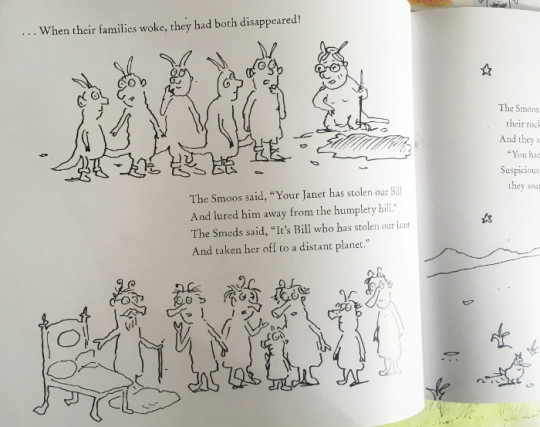
There was quite a lot of development work in the case of this book. But when it’s a story about a fox or a squirrel, I don’t do this kind of stuff. Over the years, it’s become much quicker and easier working on my books. I do far less research than I used to. Now I generally just do a quick pencil sketch then go straight to artwork.
Sometimes I have to start again because things go wrong though. This was a finished piece that was abandoned. I think I suddenly thought that the rocket was far too big or something. I do that; I work on something for ages, and then I suddenly look at it from a distance and realise that something needs redoing.
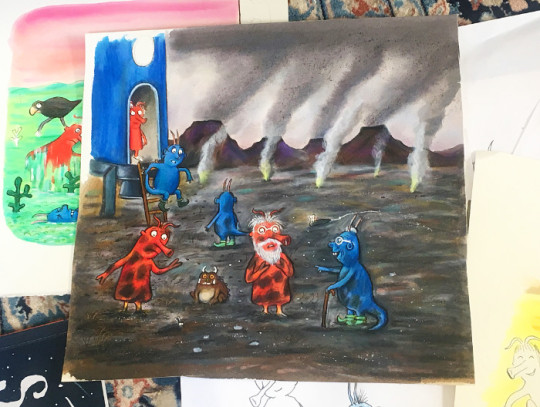
Did you spot the little Gruffalo in this picture? Since ‘The Snail and the Whale’, I’ve hidden a Gruffalo in each of my books with Julia (not ‘The Ugly Five’ though).
For almost all of the books Julia and I have done together, our editor has been Alison Green. We’re an old established team. And I’ve always worked with the publisher Kate Wilson; I followed her from Macmillan to Scholastic, and then to Nosy Crow. Julia moved from Macmillan to Scholastic, and decided to stay there. So Julia and I have some of our joint titles with Macmillan and some with Scholastic. Julia does books with other illustrators for Macmillan, and I illustrate other books for Nosy Crow.
People often ask me which of the books I’ve done with Julia is my favourite. It’s quite hard to choose, but I enjoyed working on ‘The Smartest Giant in Town’. I liked the way I could do a crazy world with animals, giants, fairytale characters, everything mixed together without anyone caring or questioning it. I’ll show you a few things from the box...
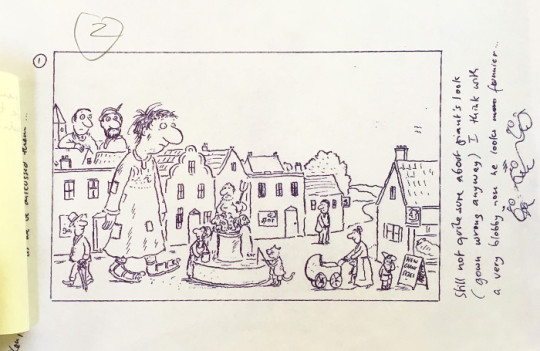
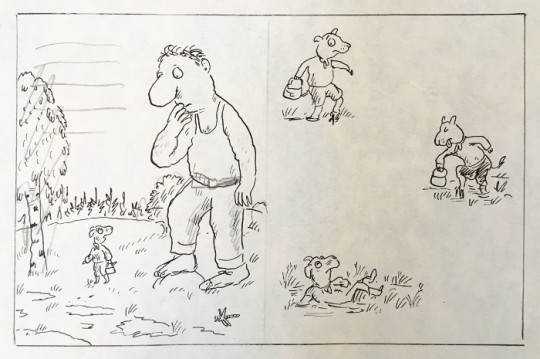
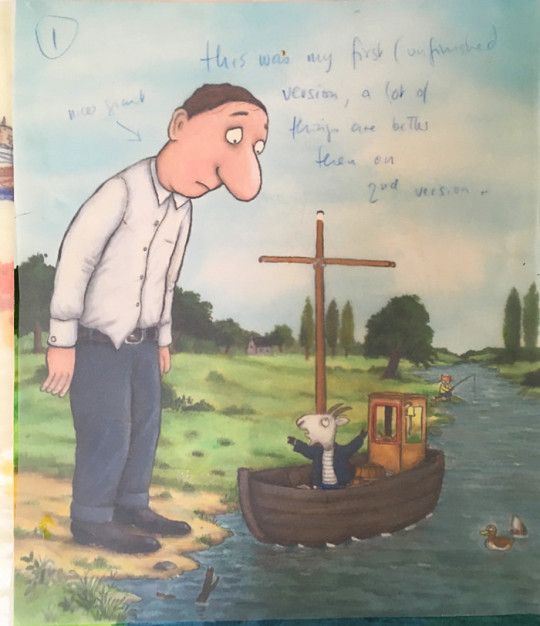
For this book, the cover was changed at the last minute. The original design had the title written on a poster stuck on a brick wall, but the sales people said they wanted a landscape, so I did another one. Years later, they used the original design for a new paperback edition, so it wasn’t completely wasted in the end.
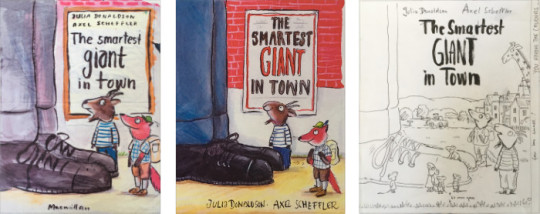
I mentioned my endless sketchbooks earlier. I’ll show you a few of them. This was mainly me playing around without thinking about what I was doing; it wasn’t a conscious thing.
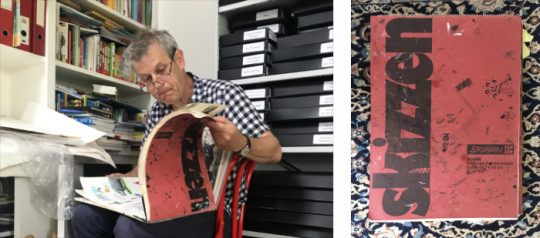
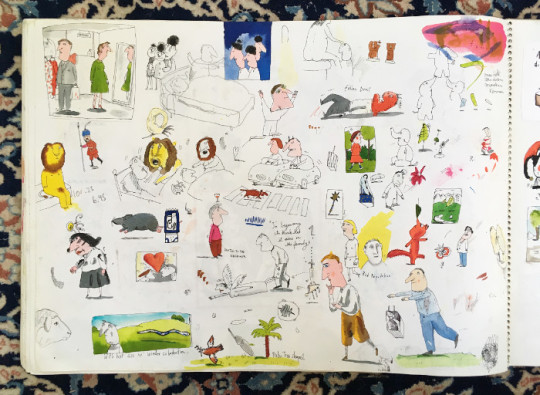
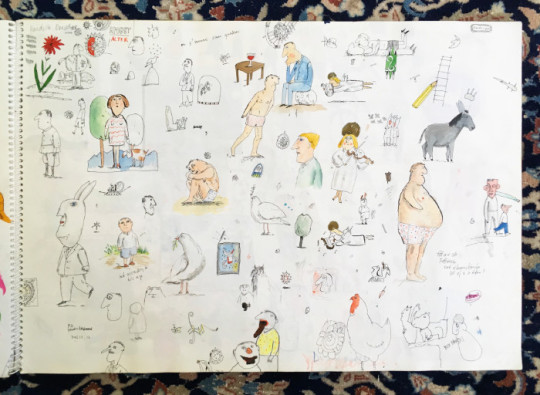
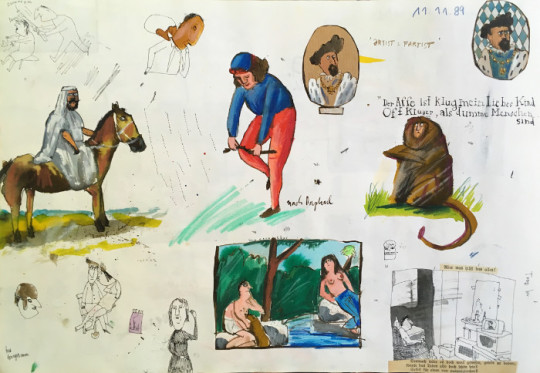
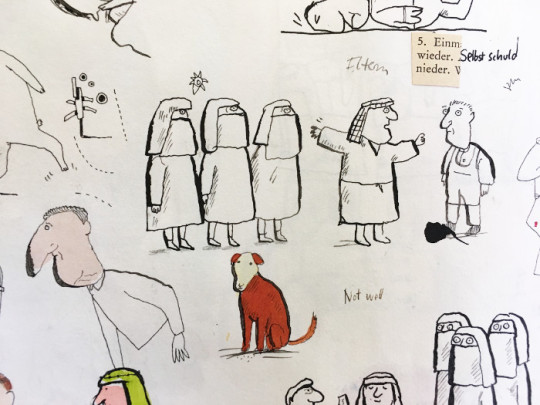
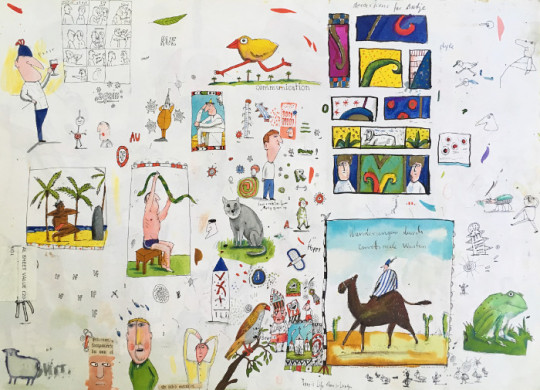
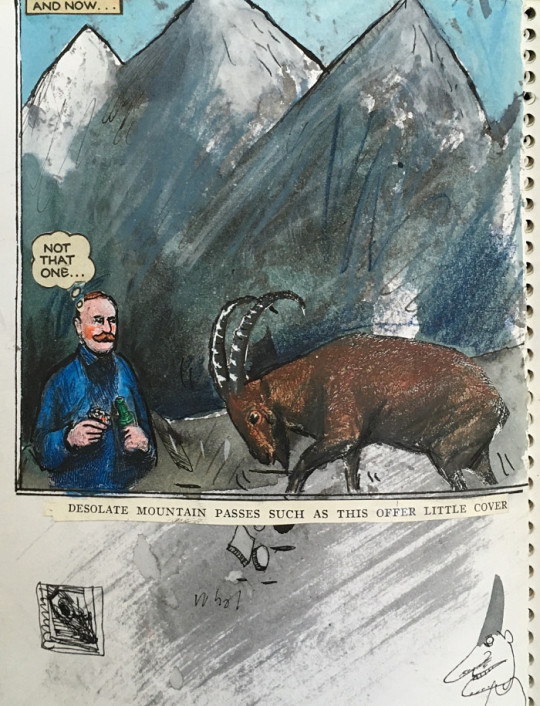
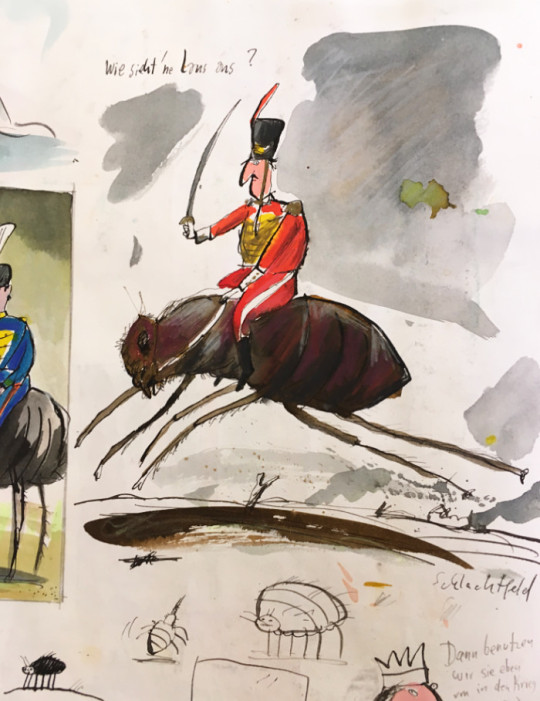
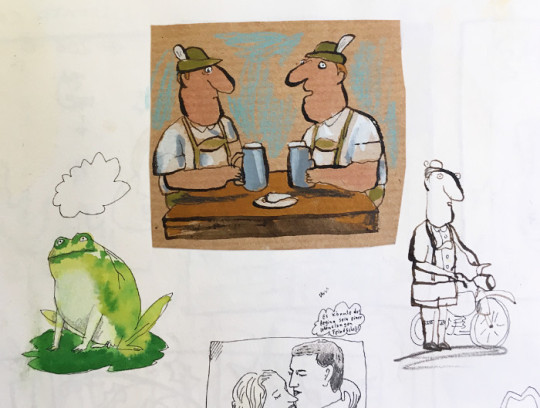
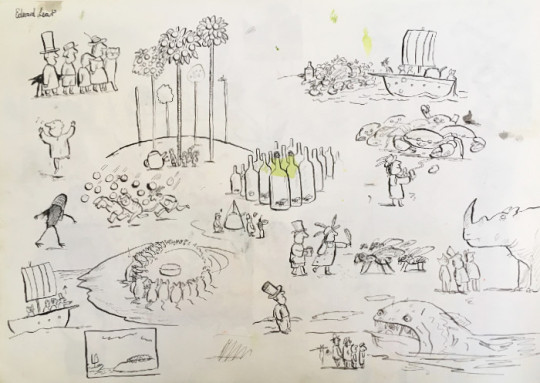
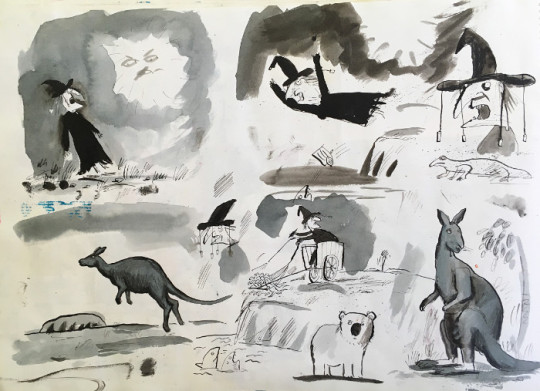
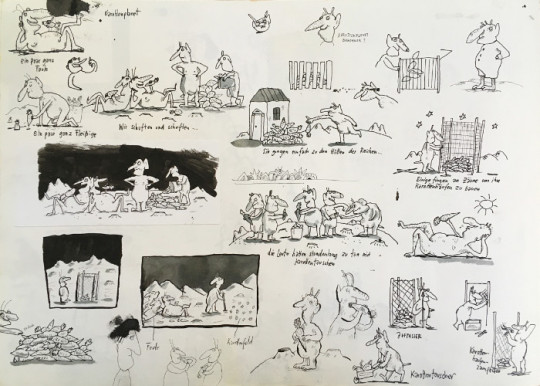
I haven’t looked at these sketchbooks for ages. It was such a long time ago. I don’t work in sketchbooks like this anymore, and I no longer doodle. But for fun, I make illustrated envelopes for friends.
I often think about doing a book with just pictures, but I’m always too busy doing other things. Posthumously, perhaps there will be time to do this. I’d also love to experiment and be more spontaneous; it’s been my dream for decades to do something completely different. But when I receive a book project, I always feel under pressure to finish it, and I’m always late with everything, so I end up doing it the way I’ve always done it.
This is my drawing table, which is and always has been too small and too messy. I think I have to accept it will always be this way.
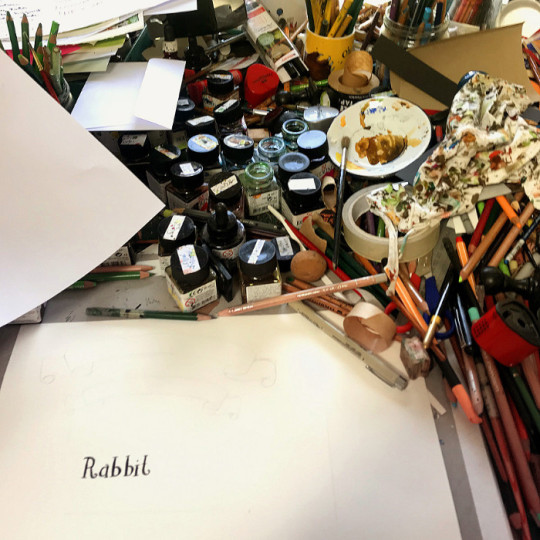
I use Saunders Waterford paper for my illustrations. It’s funny how we all have our special paper. My rough sketches are often quite small, so I have them blown up to the correct size. Then I trace the sketches on a lightbox onto my watercolour paper. After that, I draw the outlines in black ink with a dip pen. I colour everything with Ecoline inks using brushes, and then coloured pencils on top of it (I use Faber Polychromos and Prismacolour crayons). I might then need to redraw some of the black lines, or use some white gouache for highlights.
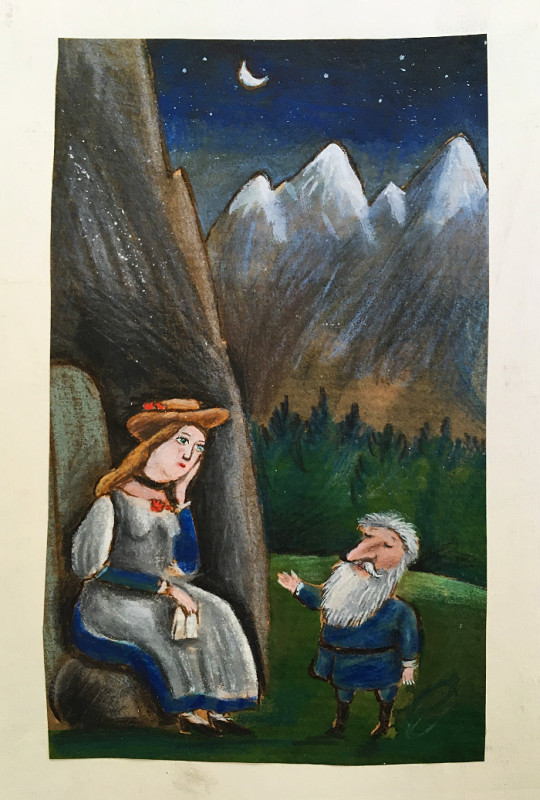
I studied History of Art in Hamburg, but left before graduating. I realised this wasn’t what I was good at; I’m not an academic.
Then I had to do my alternative service as conscientious objector. Sixteen months. There was still conscription then; that’s how old I am. I worked with mentally ill people in their homes. It was during this time that I had a friend studying ceramics at Bath Academy of Art in England. I went to visit her. I really didn’t know what else to do, so I thought maybe I could move to Bath and go to the art school. So this is what I did. The course was Visual Communications, so it was design, printmaking, photography, all that stuff. But I realised I only wanted to do illustration.
I’d gone to art college hoping to learn something. I don’t think that necessarily happened, but drawing intensively for three years was, I think, what I had needed to do. I don’t remember actually finishing any projects though.
Here’s some drawings from my student sketchbooks. I did lots of observational drawing back then, which I don’t anymore. I did it then because they told us to. I’m an obedient person!
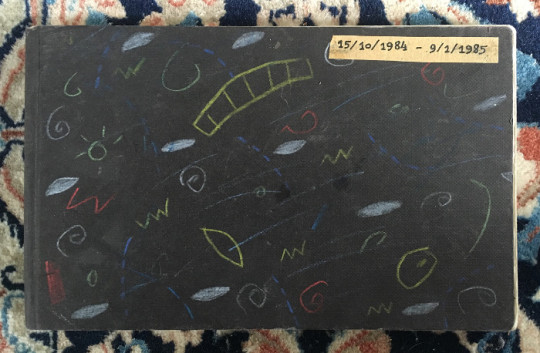
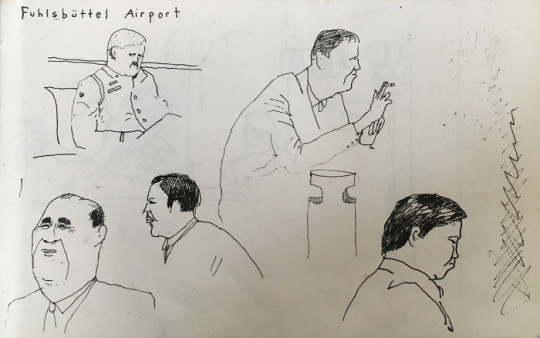
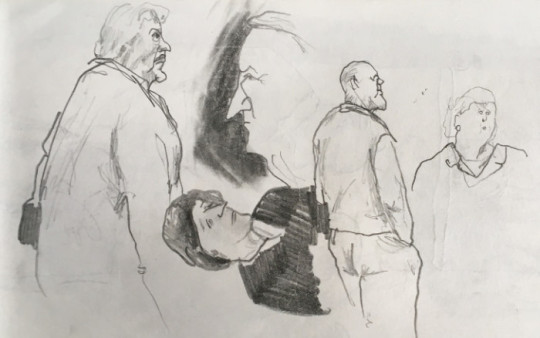
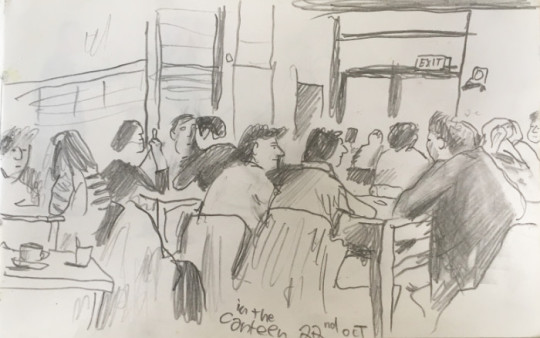
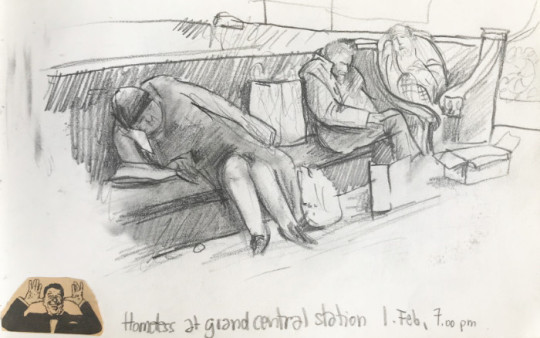
While I was a student, I did an exchange in New York: Cooper Union Art College for three months. These drawings are of Jewish immigrants, meeting for coffee. It was 1984, so many of them were still alive; refugees from Germany or Austria. I heard them speaking German, so that’s how I knew.
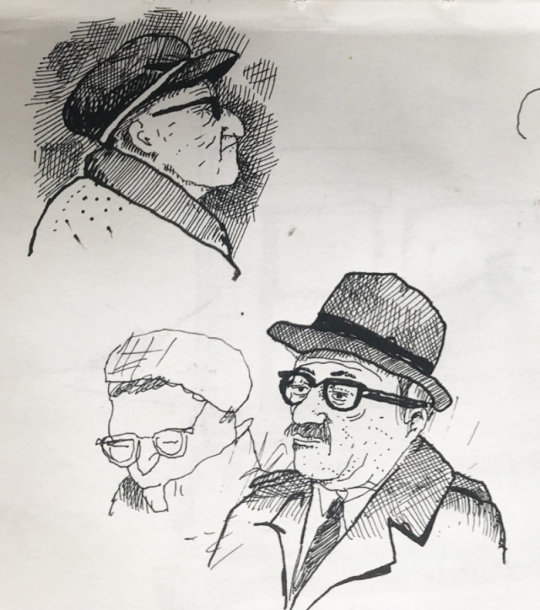
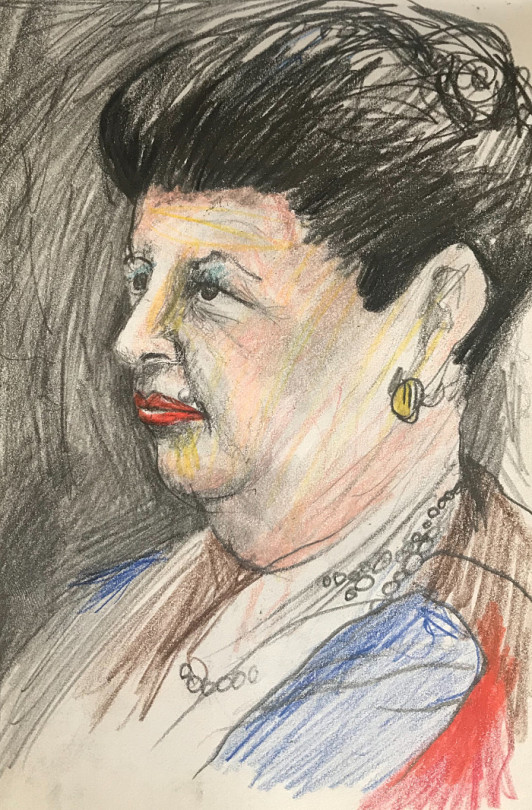
Sketchbooks are such a good way of memorising things. Nobody really knows about these sketchbooks; I used to take them to interviews, but they’ve been hidden away for years.
After I graduated, I moved to London and took my portfolio around. My art teacher had suggested I should do this to get work, so that’s what I did. In those days, you had to ring them and ask to come around. I got two commissions straight away, and it’s been busy ever since, really. I’ve always had something to do.
Here’s some of my early commissions. Starting from 1985, I guess. Very pointy noses...
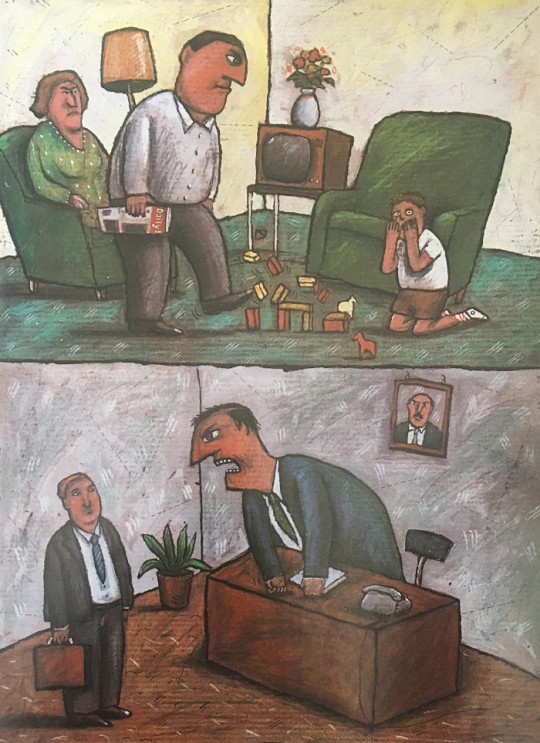
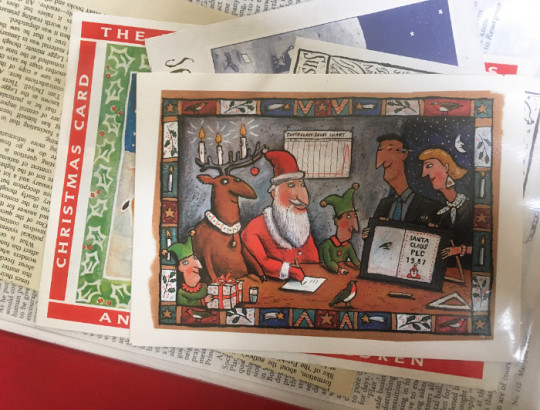
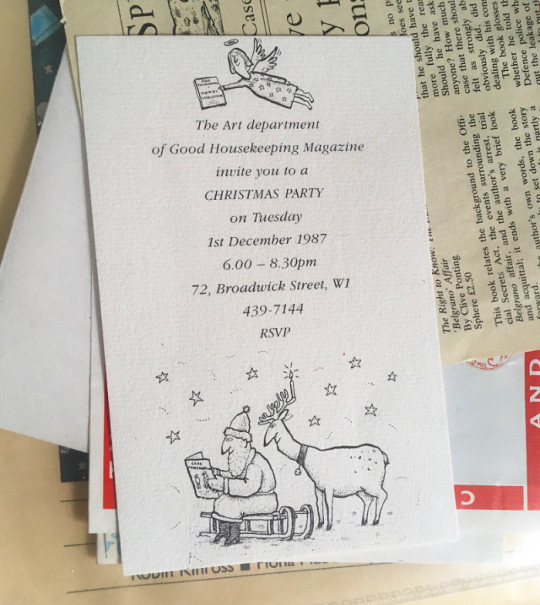
I did so much of this kind of work. It was a good way of earning money quickly. Occasionally, I still do editorial. I did some Brexit drawings for the remain campaign. Sadly, it didn’t help. Maybe I wrecked everything!
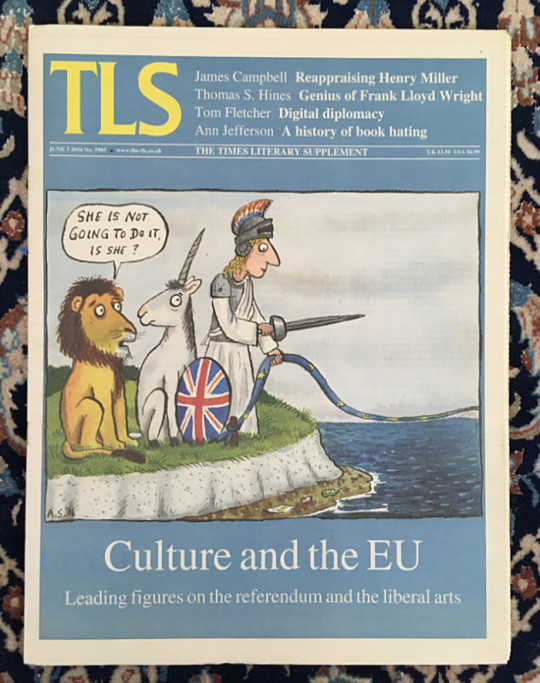
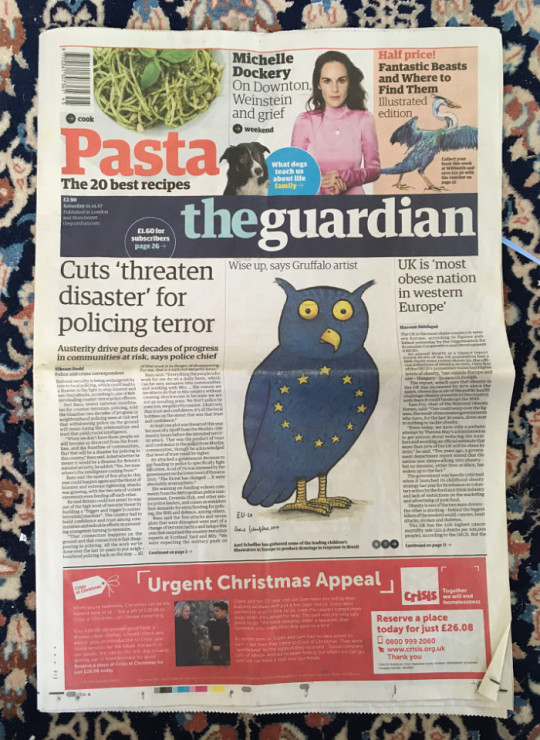
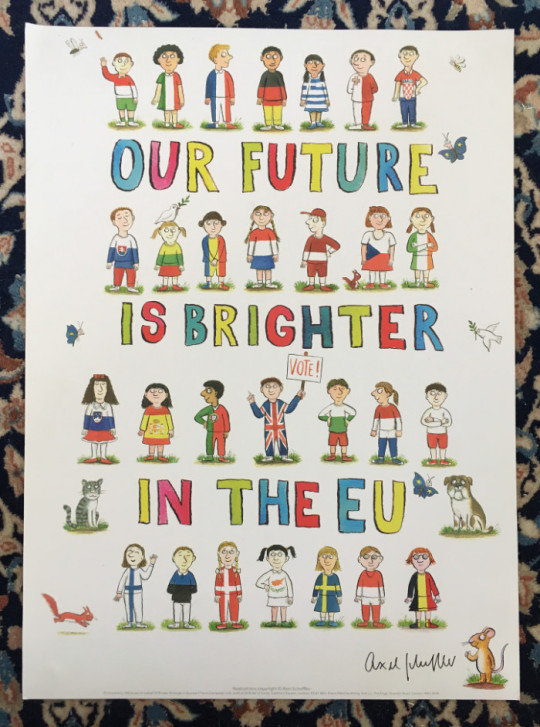
I’ll say a few words about the KIND book... 38 wonderful artists donated a picture to illustrate some of the many ways children can be kind. Such as sharing their toys or helping people from other countries to feel welcome.
One pound from each book sold goes to the Three Peas charity, which supports refugees from war-torn countries. It’s been a big success so far, and Three Peas has received a lot of money from sales in the UK and co-editions.
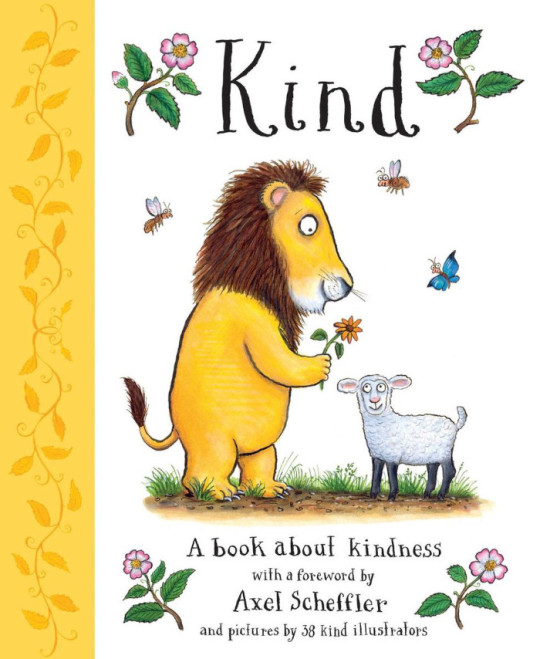

I’d quite like to do the UNKIND book next! I think illustrators would probably enjoy that, but I don’t imagine it would sell very well.
And now for something completely different! Some etchings I made when I was a student.
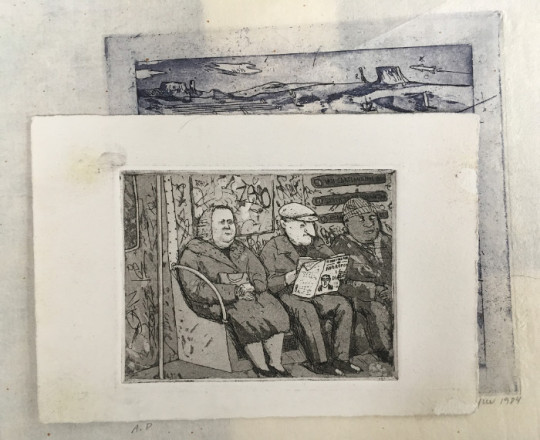
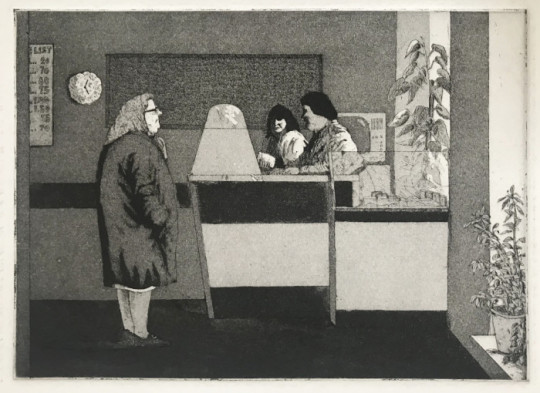
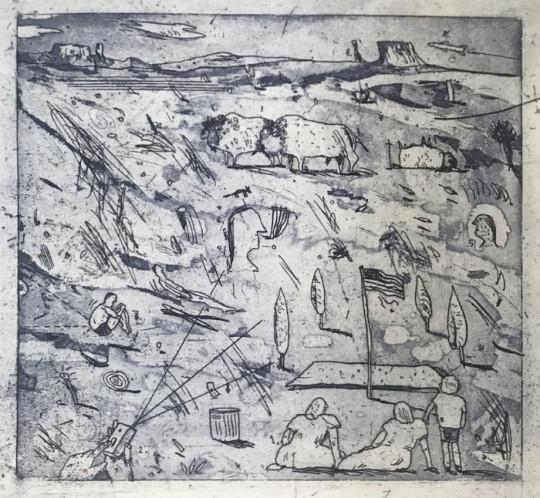
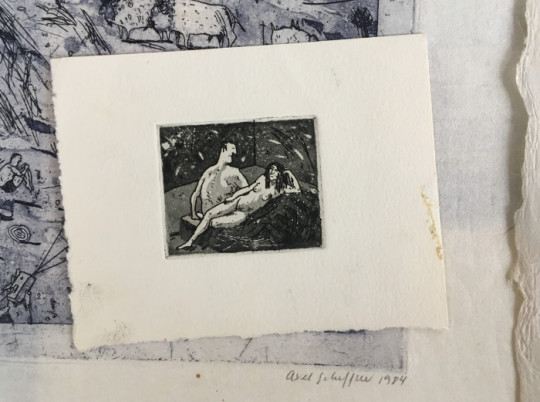
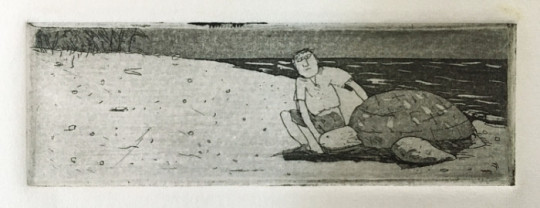

People often ask me which illustrators I’m inspired by. I don’t seek any direct influence on my work, but I’ve always said that Tomi Ungerer had the greatest influence on my approach to illustration. Although his style is quite different to mine, this humour and wackiness is something that has always appealed to me. And the details.
William Steig is someone I got into later, when I was already illustrating. And Edward Gorey of course. And Saul Steinberg. I think the Czech artist Jiří Šalamoun is wonderful. And I like Eva Lindström from Sweden a lot. She’s so great.
Okay, to finish with I’ll talk about the coronavirus work I’ve been doing...
I asked myself what I could do as a children’s illustrator to inform, as well as entertain, my readers here and abroad about the coronavirus. So I was glad when Nosy Crow asked me to illustrate a book on the subject. I think it’s extremely important for children and families to have access to reliable information in this unprecedented crisis.
You can download the free digital book in English here, and in over 60 other languages here.
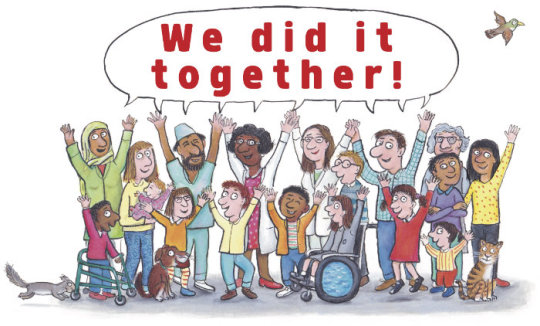
I also wanted to do something light-hearted to cheer people up, and I thought, “What if I imagine some of our characters in corona situations?” Julia liked the idea and wrote rhymes for the new scenes. This was really more about entertainment than serious information.
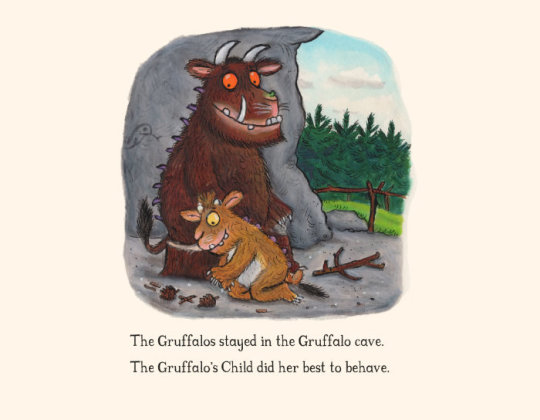
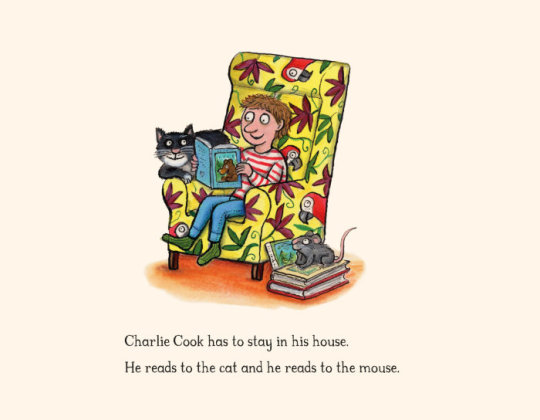
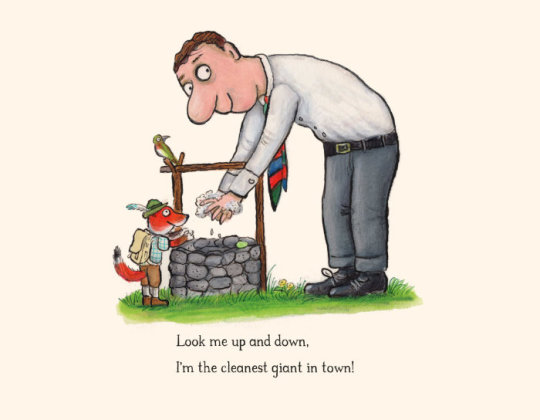
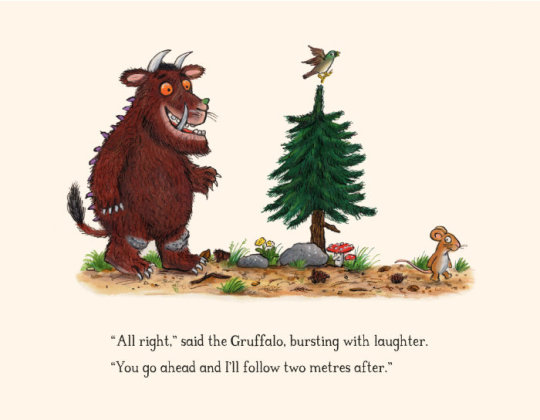
Artwork and verse © Axel Scheffler and Julia Donaldson 2020. Based on characters from ‘The Gruffalo’s Child’ (2004), ‘Charlie Cook’s Favourite Book’ (2005), ‘The Smartest Giant in Town’ (2002), and ‘The Gruffalo’ (1999) — © Macmillan Children’s Books.
And here’s one more thing: my ‘letter from lockdown’. On The Children’s Bookshow website, you’ll find lockdown letters from lots of other wonderful authors and illustrators.
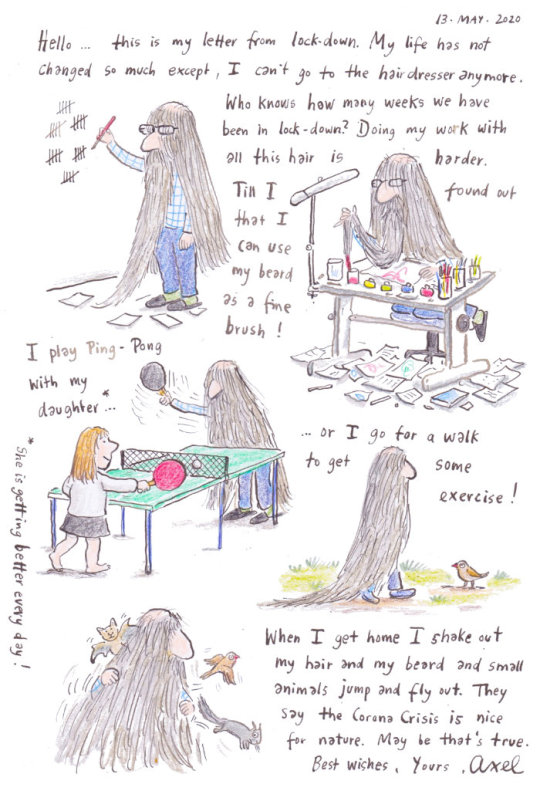
Illustrations © Axel Scheffler. Post edited by dPICTUS.
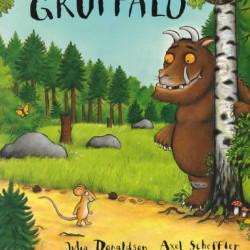
Buy this picturebook
The Gruffalo
Julia Donaldson & Axel Scheffler
Macmillan Children’s Books, UK, 1999
‘A mouse took a stroll through the deep dark wood. A fox saw the mouse and the mouse looked good.’
Walk further into the deep dark wood, and discover what happens when a quick-witted mouse comes face to face with an owl, a snake... and a hungry Gruffalo!
‘The Gruffalo’ has become a bestselling phenomenon across the world. This award-winning rhyming story of a mouse and a monster is now a modern classic, and will enchant children for years to come.
PUBLISHED IN THE FOLLOWING LANGUAGES & DIALECTS
Afrikaans
Albanian
Arabic
Australian
Azerbaijani
Basque
Belarusian
Bengali
Breton
Bulgaria
Catalan
Chinese (Simplified)
Chinese (Traditional)
Corsu
Croatian
Czech
Danish
Doric
Dundonian
Dutch
English
Esperanto
Estonian
Faroese
Farsi
Finnish
French
Frisian
Gaelic
Galician
Georgian
German
Glasgow Scots
Greek
Guernésiais
Hebrew
Hindi
Hungarian
Iceland
Indonesian
Irish
Italian
Jèrriais
Kazakh
Kölsch
Korean
Latin
Latvian
Lithuanian
Low German
Lowland Scots
Luxembourgish
Macedonian
Maltese
Manx Gaelic
Maori
Marathi
Mexican Spanish
Mongolian
Norwegian
Orcadian Scots
Polish
Portuguese
Portuguese (Brazil)
Romanian
Russian
Sami
Schwabisch
Serbian
Sesotho
Setswana
Shetland Scots
Slovakian
Slovenian
Spanish
Swedish
Swiss German
Tamil
Thai
Turkish
Ukrainian
US English
Vietnamese
Welsh
Xhosa
Zulu
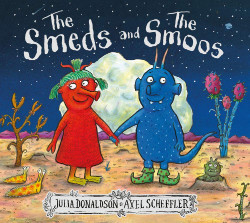
Buy this picturebook
The Smeds and The Smoos
Julia Donaldson & Axel Scheffler
Alison Green Books, UK, 2019
The Smeds (who are red) never mix with the Smoos (who are blue). So when a young Smed and Smoo fall in love, their families disapprove.
But peace is restored and love conquers all in this happiest of love stories. There’s even a gorgeous purple baby to celebrate!
PUBLISHED IN THE FOLLOWING LANGUAGES
Afrikaans
Catalan
Croatian
Dutch
English
Finnish
French
German
Hebrew
Hungarian
Italian
Korean
Luxenbourghish
Polish
Russian
Slovenian
Spanish
Swedish
Turkish
Ukrainian

Buy this picturebook
Kind
Alison Green, Axel Scheffler & 38 illustrators
Alison Green Books, UK, 2019
Imagine a world where everyone is kind; how can we make that come true? With gorgeous pictures by a host of top illustrators, KIND is a timely, inspiring picturebook about the many ways children can be kind, from sharing their toys and games, to helping those from other countries feel welcome.
One pound from the sale of each printed copy will go to the Three Peas charity, which gives vital help to refugees from war-torn countries.
PUBLISHED IN THE FOLLOWING LANGUAGES
Bulgarian
Catalan
Chinese (Simplified)
Chinese (Traditional)
English
French
German
Greek
Hebrew
Italian
Korean
Netherlands
Portuguese (Brazil)
Romanian
Spanish
Swedish
Turkish
Vietnamese

2 notes
·
View notes
Text
This is my idea || Ch. 1
I made this post about an AU with the song “This is my Idea” from The Swan Princess (like half a year ago and only posting it now XD). This mini series will have three parts of their relationship throughout three stages.
(Kids) // Teenagers // Adults
Little Hyde excitedly ran down the stairs, taking two steps at a time. It was dangerous but he wanted to go outside as soon as possible. He had so many things planned for the summer: visiting Wrath’s apple farm, eating at every stall during the summer festival with World End, and so much more. He was even able to convince his lazy brother, Kuro, to take him fishing.
Yes, it was looking to be the most eventful summer of his young life.
He spotted his big brother, Hugh, at the bottom of the stairs and waved to him. They were planning to see his favourite play for the first day of summer. In his excitement, Hyde tripped and began to tumble down the stairs. He wasn’t hurt because Hugh quickly caught him. Hyde grinned happily at Hugh who looked less than amused. He began to give him a lecture that Hyde was all too familiar with.
“Now, is this any way for the future king to behave? I promised to take you to see Hamlet on the condition that you take your role more seriously. You were very lucky to have been adopted by King Guildenstern so you need to be diligent with your new responsibilities.” Hugh went on about his obligations but Hyde only half listened to him. He was relieved when his sister came to his defence.
“Hyde is only seven so let him be a child while he still can. He doesn’t have to start his formal training until he’s thirteen.” Wrath pointed out and Hyde stuck out his tongue at Hugh from behind the safety of his sister’s skirt. That earned him a light glare from her. “Your brother is looking out for you so don’t treat him so disrespectfully. You can play in the summer but make sure to study hard in the fall.”
“Yes, Wrath.” Hyde mumbled and she nodded. She gently pushed him towards Hugh. He readily took his big brother’s hand and they started to leave together. So, Hyde had to groan when Gil stopped them. It seemed like he would never be able to see his favourite play.
“Hyde, there’s someone I want you to meet.” He said and Hyde noticed that two people were following Gil. One was a man and the other was a boy his age. He watched the boy curiously because he had a strange white streak in his dark hair. The boy tilted his head slightly and watched him as well. “Hyde, this is Licht and he’ll be staying with us for the summer. He’s from the neighbouring kingdom and I expect you to make him feel welcomed. Go on and introduce yourself.”
“Welcome, my name’s Hyde!” He said in German even though he was still learning the language. The neighbouring kingdom mainly spoke German so he thought that it would be easier to speak with him in his native tongue. Hyde stepped in front of Licht and held out his hand with a large smile. “Let’s have a fun summer together. I know a little German so I can translate anything you don’t understand.”
“Are you making fun of me? Your German is butchered beyond belief. I don’t need you to translate because I’m well versed in many languages, unlike you.” Licht replied in English.
Hyde was about to hit him when Wrath held him back. His education was a rather sensitive subject for him because he was born a peasant. He used to work as a servant in the castle and Gil discovered he was bright and proficient at literature after speaking with him. When he learned that he was an orphan, he decided to adopt Hyde and his siblings.
“Just let me kick him once, Wrath! He deserves it!” Hyde argued with her in Japanese so Licht wouldn’t understand him.
Unfortunately, he did. Licht broke away from Kranz and tackled him to the ground. “You’re the one that made fun of my language by speaking it so poorly! I’ll teach you a lesson right now, Demon!”
“Stop you two!” The two kings had to pry their charges apart. From the two’s defiant expressions, it was obvious that they still wanted to fight each other so they held onto their hands securely. In a gentle yet stern voice, Kranz spoke to Licht. “Hyde was trying to be considerate so apologize, Licht.”
“Why should I apologize? I did nothing wrong. It’s my duty to purify demons who are rude! Why? Because I’m an angel.” Licht said simply, as if it was the most obvious thing in the world. The pose he made caused Hyde to burst into laughter. Licht took off his shoe to throw at Hyde in retaliation.
Hugh caught it nimbly and Wrath gave the child a cold frown. Under the pair’s hard eyes, Licht had to shrink back. Gil knew how protective the siblings were of each other so he stepped in before they could scare Licht any further. “I need to discuss an important matter with Hyde in the library so please wait for us in the hall. Come now, Hyde.”
Reluctantly, Hyde followed Gil into the library. As they walked, he watched Licht from the corner of his eyes. He hoped that he would only stay a few days so he could enjoy his summer with his family. When Licht glared at him, Hyde returned it and tripped him subtly. That caused another fight between the two and their fathers had to drag them apart.
“Hyde!” He reprimanded. "Licht is a prince like you so you must treat him with respect. I don't want to see you two kids fight anymore."
"That goes for you as well, Licht." Kranz urged the small boy to sit in a chair. Once the two were quiet, he went on to explain. "The reason behind our meeting is because we will be signing a treaty between our two kingdoms. Now that you two are allies, we want you two to become friends. This alliance will be stronger if it were more than mere words on a page."
"I will never be friends with him!" They both yelled at the same time and then exchanged a scowl.
"Give it a chance." Kranz spoke in a soft voice but Gil's tone was much firmer.
"You two will learn to get along for the sake of your kingdom. Every summer, Licht will visit us. During the winter, Hyde will go to your kingdom. Play with each other and try to become friends. Maybe you two will learn that you have something in common in that time. Until we see you two getting along, you will be confined to the library."
"What about everything I had planned for the summer? I was supposed to see a play with Hugh and enjoy the festival with World End today. I had the rest of my summer planned too. This isn't fair! Make someone else spend time with him." Hyde complained but Gil only brushed off his concern.
"But Winter is when Mahiru visits to tutor me and teach me the piano!" Licht jumped off his chair and pleaded with Kranz. "If I'm stuck with that demon the entire Winter, I'll barely be able to play! He'll probably bother me the entire time. Who cares if we're friends as long as we have the treaty?"
"We aren't going to change our minds on this so we suggest you two make the best of this situation." He said. For the first time, Licht and Hyde could agree on something. They both hated the idea of having to spend time together instead of doing what they loved. Neither of them believed that they would get along or become anything more.
"This was supposed to be the best summer ever but you ruined it." Hyde huffed and slumped onto the couch. He sighed heavily and shifted until he was hanging over the couch cushions. Upside down, he glared at the boy that was the source of his troubles. Licht was occupying himself with the books in the library and ignoring him despite how their fathers told them to play together.
He picked up one of the books and threw it at the dark haired boy. Licht turned on him sharply. "What was that for, Shit Rat? You want me to throw you out the window?"
"Gil nailed down the windows so we can't escape that way." Hyde reminded him. "There's nothing to do! I already read every book in this room and I'm bored. I can't believe I have to spend every summer like this. What makes them think that we'll have anything in common?"
"Can you stop complaining, Demon? Your voice is annoying when I'm trying to read. This library doesn't even have a piano for me to practise. If anyone is going to be bored, it's going to be me." Licht clicked his tongue and snapped the book closed. "Why are there so many books by this Shakespeare person? He writes funny and you can't understand a thing."
"Hey, he's my favourite!" Hyde jumped off the couch and he was ready to fight him again. He only stopped when the door opened because he thought that it was Gil checking on them. He didn't want to listen to one of his lectured. Instead of Gil entering, it was Kuro and JeJe. He immediately brightened at the sight of his brothers.
"I heard you were under house arrest." Kuro said as he closed the door behind them. He knelt in front of his brother and whispered. "We're going to break you out and take you to Wrath's farm. It'll take a while for him to find us there. That should give you enough time to enjoy yourself before Gil drags you back here. JeJe will stay and keep him from discovering that you're missing too."
"Yay!" Hyde cheered and hugged his brother.
"Don't make such a big deal about this." Kuro grumbled but returned his hug briefly. Then he left him go and ruffled his hair. "It was Lily's idea so thank him when we get to the farm. He said that you'll be sad after missing your Hamlet thing. We thought that we could help you do one of the things you wanted. Let's go before Wrath gets worried about us and gives us a lecture."
He opened a hidden door behind a bookcase and ushered his brother in. Hyde was only too happy to obliged and skipped forward. He only stopped when he felt something tug on his scarf. He looked over his shoulder and saw that it was Licht who stopped him. "What do you want? If you tell Gil and Kranz about this, I'm going throw a book at you."
"I want to go with you. I'm not going to stay here with your brother while you're out there having fun." Licht declared. He refused to let go of him despite how much Hyde tried to take back his scarf.
"Can't deal." Kuro watched the two boys fight and sighed heavily. He loved his little brother but he could be exasperating. He stopped their fight by lifting Hyde into his arms. Then he took Licht's hand and led him through the door. "Just let your little friend join, Hyde. You're wasting our time fighting. I could be sleeping under a tree and eating apple pie by now."
"Apple pie?" Hyde beamed and then looked down at Licht. "Fine, you can come with us."
"As if I need your permission. If I want to join, I will."
Licht was a little overwhelmed with the family. He was an only child and his parents died when he was young. After he was adopted by Kranz, he lived in the castle but there were few children there. The few that lived in the castle didn't talk to him because of his title as prince. Mahiru was the only person that treated him like a normal angel. That was why he always looked forward to his visit in the winter.
From his seat on the tree branch, he watched the group eat and speak excitedly. He almost wished that he hadn't followed him to the farm. He could hear their laughter below but he couldn't make out what they were saying. Wrath handed him a plate piled high with sweets but something she said made Hyde pout. Eventually, Hyde slipped out of his seat and went to the tree Licht sat in.
"Hey, my sister said I should give you some food. Come down and eat with us. I'm not allowed to go back until I give you this plate." Hyde called up to him and held out the plate as a peace offering.
"I don't want anything from a demon like you." Licht called back. He thought that Hyde would give up or throw the food at him but he didn't. Hyde balanced the plate on his head and climbed the tree. It was a little difficult to move while keeping the plate from falling but he eventually made his way to Licht. He grinned triumphantly once he reached him.
"I can't go back until you eat. C'mon, they taste great! There's apple pie, angel food cake and—"
"If I eat, will you leave?" Licht took the plate off his head and placed it on his lap. The branch shook slightly when Hyde settled himself next to him. He stole a cookie off his plate and Licht briefly considered pushing him out of the tree. He decided not to and ate the angel food cake. "This is actually good! Of course, my friend Mahiru bakes better."
"My sister is the best!" Hyde argued between bites. From the corner of his eyes, he studied Licht's expression. He looked happy as he ate the cake. It was the first time that day that he seen him smile and it was rather charming. "Your face is covered in icing, Angel Cakes."
"Don't call me that. I'm an angel, not a pastry." He wiped his cheek with his sleeve. Licht swung his legs joyfully as he looked over the apple farm. It was beautiful and he thought that it would be a shame that they would have to spend the entire summer in the library. When he voiced that thought to him, Hyde had a thoughtful expression.
"Kuro showed us that secret door! We can sneak out of the library whenever we want. I'll show you all the great places in the kingdom." He suggested, a little excited that he could do the things he planned. Of course, he didn't know what will happen if the angel joined him. "My kingdom's great. You'll have a lot of fun."
"Mine is better." Licht said. He had to admit that he was a little competitive and proud. "We have a pond right next to my castle and we can go ice skating whenever we want in the Winter."
"Then let's see whose kingdom has more fun places. I'll take you to the pond we fish at and you'll take me to the pond you ice skate at." Hyde challenged and held up his pinky. Not one to back down, Licht held up his pinky as well. They wrapped their pinkies together and Hyde grinned. This summer would be one of the most eventful in his life.
I’m not the biggest fan of The Swan Princess but I liked the intro song of them as reluctant children because it’s a fun little concept.
#servamp#lawlicht#greed pair#servamp hyde#licht jekylland todoroki#servamp hugh#servamp mother of wrath#servamp kuro#fanfiction
52 notes
·
View notes
Text
The Made-Up Language That Accidentally Became Real: The Story of Klingon
A version of this post originally appeared on Tedium, a twice-weekly newsletter that hunts for the end of the long tail.
Not too long ago, I drove by a radio station with an apostrophe in its call sign. Reading it aloud, it seemed the apostrophe affected an actual word, but my inner Star Trek fan immediately decided it simply must be a Klingon radio station.
Sadly, it was just a country station, but the experience prompted a silly thought: what if there were an actual Klingon radio station? Surely some dedicated Trekkers around the world may have done the same thing with the Klingon language that some enterprising (get it?) Star Trek fans did with folk music decades before.
The world is a bit bleak at the moment, so we decided to get a little nerdy this week and dive into an entirely new frontier. So grab a bowl of your favorite Klingon cuisine and a barrel of blood wine, because we’re exploring something a bit different: the Klingon language and its interesting impact on modern pop culture.
1985
The year in which The Klingon Dictionary saw its initial publication. The book includes grammar, vocabulary, and a vital pronunciation guide for the language. The book did not, however, provide any exercises or practice guides for actually learning the language. This likely decreased its efficacy for actually learning the language, but it was probably intended more as a guide for actors and a fun collectible for Trek fans than anything else. The book inspired at least one current Internet Archive user to create a HyperCard stack to help them learn the language in convenient electronic form. A second edition saw publication in 1992.
How a professional linguist transformed some gibberish into a constructed language
Like any story worth telling, the history of the Klingon language begins with improvisation. Some reports—including the DVD commentary for Star Trek: The Motion Picture Director’s Cut—maintain the genesis of the language rests with James Doohan (who played Montgomery “Scotty” Scott on the original show) and the film’s associate producer Jon Povill. The two had a meeting where they established a few basic words the aliens would utter throughout the movie. Doohan recorded the words for veteran Trek actor Mark Lenard, who portrayed a Klingon captain in the film. Lenard transcribed the words phonetically and practiced them to nail the delivery of his lines in the film. Doohan and Povill didn’t develop the language further. That honorable duty befell another man who wouldn’t enter the picture until Wrath of Khan’s editing phase.
Enter legendary linguist Marc Okrand, the creator of the Klingon language. Okrand began his career teaching linguistics courses in Santa Barbara, CA. Following his stint as a university teacher, he joined the Smithsonian Institute for a while researching California Native American languages that hadn’t been spoken for a long time. Following that, he began to work with The National Captioning Institute on developing closed captioning for educational purposes and the hearing impaired (look for a future issue of Tedium on the subject). In the midst of a fruitful career, Okrand stumbled almost accidentally into working on Star Trek through his captioning work.
Though it didn’t make its debut until the third Trek film, the genesis of the Klingon language in its current form actually lies with The Wrath of Kahn. In that film, there were two Vulcan characters speaking to each other in a corridor. The producers shot the scene with the actors speaking English but later decided to change it to the Vulcan language. The trouble was, a Vulcan language didn’t exist. Unbeknownst to anyone at the time, Marc Okrand would soon become the hero the film didn’t realize it needed.
Okrand believes luck played a significant role in gaining the opportunity in the first place. He was only in California for one week but had nothing to do for three days. He had two friends making Star Trek who wanted his opinion about expanding the alien languages within the film. It turned out to be a major headache for the film’s producers and they needed to resolve it within the week—the same week in which Okrand was visiting the state.
In 2018, Okrand told The Washington Post how he became involved in bringing alien languages to the franchise:
My real job, the one that really paid the bills, was closed captioning. The first program we did live was the Oscars, 1982. They flew me out to L.A., and I was having lunch with a friend who worked at Paramount. She and I go out to lunch, and the fact that I was a linguist came up—I have a PhD in linguistics. They wanted a linguist to come and make up gobbledygook that matches the lip movements. And I said, “I can do that!”
He only received a few hundred dollars for his work, but he delighted in his experience teaching Mr. Spock how to speak Vulcan. But following the success of the second film, something unexpected happened: Okrand received a call from Harve Bennett—the writer/producer of Star Trek III: The Search for Spock—asking him to create a full language for the Klingons to use in the film. As he told interviewer EC Henry in 2016, “every once in a while in life, you’re presented with a decision that’s really easy to make. That was one of those!”
The Search for Spock and most subsequent Star Trek programs featured Okrand’s language in some form, including the most recent Trek films up to Star Trek Into Darkness. He was still involved in Star Trek Beyond, too, creating several different languages for that film.
petaQ
The most common Klingon curse word. In the spirit of Nicolas Cage’s new Netflix show, we simply had to include this one. Usually written as P’Takh—Klingons sure do love their apostrophes—it’s always used as a noun in the show to insult other characters. It’s pronounced more like “pet-ock” with an extremely harsh guttural sound at the end. According to the Klingon Language Institute, the root of the word is “taQ” meaning “to be weird,” or indicating some kind of strangeness. But it’s more likely that it’s merely a common, interchangeable insult or as Enterprise suggests, it means “enemy.” A good runner up is probably “Qapla/Q’Plah”—the Klingon equivalent of “Have a Nice Day.” Imagine that on a bumper sticker or a T-shirt.
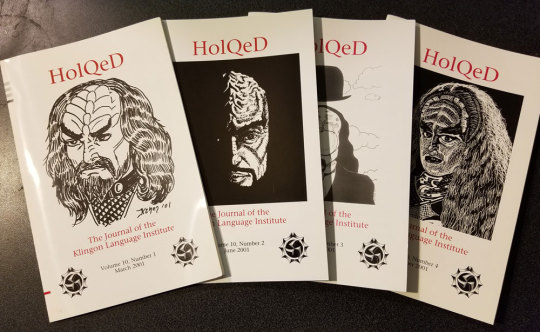
Examples of journals sold by the Klingon Language Institute; the institute also offers translations of well-known books in the language.
The language eventually grew much larger than the property for which it was developed
It may be difficult to believe, but per the Guinness Book of World Records, Klingon is the most widely spoken fictional language in the world. It even has an entire, well-known institute dedicated to learning Klingon.
The language itself is harsh, guttural, and bears some resemblance to a mix of Yiddish, some Native American languages, and German. Anytime Okrand approached sounding similar to any of real language, he adjusted the Klingon words to differentiate them from sounding like real-life language, resulting in some of the very unique words one hears in Klingon.
What differentiates Klingon from other constructed languages—like J.R.R. Tolkien’s Elvish languages or some of the constructed languages in Game of Thrones—is the piecemeal nature of the language’s construction. Okrand designed the language as needed, based on the needs of the episodes and films for which he was consulted. It didn’t see further realization or development until much later.
The Klingon Dictionary took the idea to another level entirely, even if it didn’t fully function as a learner’s guide to the language. The book’s success led to other publications like the audiobooks Conversational Klingon and Power Klingon. 1997 brought the long-anticipated follow-up to the dictionary, Klingon for the Galactic Traveler. There’s even an interactive CD-ROM Star Trek: Klingon, whose third disc features a Klingon language lab.
There haven’t been any additional Klingon language books or multimedia since, but a group of speakers formed The Klingon Language Institute in 1992 to further the learning and development of the language over time. The Pennsylvania-based institute isn’t a loose organization of Trek enthusiasts; it’s a full non-profit organization dedicated to legitimately teaching Klingon through lessons, translators, and other online resources. They even offer a Klingon Language Certification Program.
Before going fully electronic, KLI published a quarterly journal, poetry, and fiction in the language and at one time even offered a $500 scholarship. It’s founder, Lawrence M. Schoen, is an accomplished speaker who currently acts as the institute’s director. KLI’s members still meet up once a year to lecture, teach, learn and discuss the language—all while having a good time, of course. Per KLI, only a few people are fluent enough in Klingon to actually speak it conversationally.
Okrand maintains a positive attitude and relationship with speakers of the language, but as he told Henry back in 2016, he “doesn’t speak it very well” because of the way he made it up in the first place. The language was built to one line at a time to suit the story of the show. He’d coach actors to say the lines, get through the process, and move on. Then he forgot some of it, so writing the book required more effort on his part to not only flesh out the language but almost rebuild it from some of his previous work on Trek.
In several interviews, Okrand is clearly proud of his work, but would definitely do it a bit differently if given the opportunity. He would have thought more about the structure and design of the language rather than simply creating words on the fly and revising them later. Despite the movie-prop nature of its construction, Klingon managed to evolve.
Okrand is still involved in the language as it continues developing, and people still ask him about creating new words to grow the language. At this point, Klingon is a developing constructed language that’s cemented its place in society outside of Star Trek. Okrand realizes it’s much larger than he ever intended, telling a convention in 2016 about the future of the language:
“At some point, it’ll grow without me, and that’s fine.”
“When I wrote the dictionary, I thought people would put it on their coffee table and reference it for fun, but a few years later, I found out they were dissecting and analyzing it. And thanks to the Internet, people were meeting on message boards to talk in Klingon.”
— Marc Okrand, the creator of the Klingon language. In a 2013 interview with Mashable, he marveled at how far the language he built for the Star Trek movies took off in real-life. While Okrand still referenced the dictionary while working the films at that time, he still asserts many other people speak the language much better than he does.

The Klingon Dictionary, because of course. Image: Bookshop
Dedicated speakers and technology helped the Klingon language transcend pop culture
Klingon was still going strong as the internet developed into its present form. Per Okrand, the rise of forums and internet chat actually may have helped breathe further life into the language. It’s obvious that Trek fans love it, but what’s most interesting about the language is how common it is among non-Star Trek fans. For instance, linguists and language enthusiasts love studying it or teaching it to family, like the PhD candidate who taught his young son Klingon to better understand the language. The man, D’Armond Speers, became academically interested in the language after seeing a flyer for the KLI.
That isn’t to say there aren’t plenty of fans who enjoy using the language and taking it to the higher levels. Capitalizing on the new age of smartphones, Simon & Schuster released The Klingon dictionary and language suite (containing the dictionary, Conversational Klingon, and other digital tools) for iPhone around 2009. Running from $3.99 to $11.99, iPhone users could learn Klingon in digital style.
Nowadays, DuoLingo and Youtube offer several ways to learn Klingon, from visual lessons to interactive studying.
On the pop culture front, some students of the Klingon language decided to translate Hamlet into the language to astonishing success. There was an insane Pizza Hut commercial spoken (and written!) entirely in Klingon. And you know something is truly popular when Rhett & Link feature it on Good Mythical Morning. And if you’re looking to groove to some Klingon-inspired tunes, you can’t go wrong with Klingon Pop Warrior or Stovokor.
I never found a good example of a Klingon radio station (aside from a long defunct fake station called, appropriately, KPLA radio), but Klingon opera is alive and well in the modern day.
One of the frequently recurring aspects of Worf’s character in Star Trek: Deep Space Nine is his love of Klingon Opera. Have you ever wondered what if Klingon Opera’s were a thing? As it turns out, a legitimate opera entitled ‘U’ was written and performed in Klingon. The U stands for “Universal.”
It was essentially a song in the key of Kahless, telling the story of the Klingon leader. Composed by Eef van Breen with a libretto by Kees Ligtelijn and Marc Okrand, the opera debuted in the Netherlands in 2010 to an enthusiastic audience reaction. Floris Schönfeld handled the artistic direction. It played a few more dates in 2012, but hasn’t been seen since. Don’t despair, though, as there may be a new Klingon Opera in the works.
Outside such creative endeavors, there seems to be a resurgence of the language in popular shows like the eternally annoying The Big Bang Theory. With the sole exception of the Barenaked Ladies’ theme song, I simply don’t enjoy The Big Bang Theory. While Star Trek references—including several instances of conversationally using the Klingon language—litter the show, it’s just not my cup of tea (I prefer chilled Earl Gray). It is, however, notable for bringing Klingon Boggle and The Klingon Dictionary back into the collective pop culture mind. If there’s one thing I dislike more than watching The Big Bang Theory, it’s probably playing a game of Monopoly. Yes, I am aware the game was joked about in the show before it came out. Per Memory Alpha, this may have been intentional product placement on the part of Hasbro. Either way, the real-estate trading game traces its origins back to the early 1900s and has its own unique history, but this astonishing board game has the distinction of merging Klingon and a popular board game, effectively bringing the language further into public consciousness.
And I thought real-life Klingon operas were weird.
“Speaking Klingon is a great way to make new friends.”
— Michael Dorn, the actor who played Lieutenant Commander Worf in Star Trek: the Next Generation and Star Trek: Deep Space Nine, during an ad for Rosetta Stone: Klingon. Dorn goes on to discuss how fun the language can be, with plenty of enthusiastic participants demonstrating their language skills. Of course, this was simply an April Fool’s joke perpetrated by ThinkGeek in 2014, but it’s a great piece of Klingon language history nonetheless.
As time and technology evolve, it truly seems as if the Klingon language will continue to capture the hearts and minds of both Trek fans and non-Trek fans alike. One doesn’t need to be a fan to learn and enjoy the language. All you need is an interest and the resources to learn.
It overcame a legal battle over copyright of the language in 2016 and may even be useful for treating dyslexia. Not bad for a constructed language designed for aliens in a Star Trek movie.
Marc Okrand’s work in closed captioning is legendary, but he left an indelible mark on both linguistics and pop culture for a long time to come. You don’t have to be a sci-fi fan to appreciate Klingon.
So until next time, stay safe, be kind to each other, and don’t forget to always say Q’Plah!
The Made-Up Language That Accidentally Became Real: The Story of Klingon syndicated from https://triviaqaweb.wordpress.com/feed/
0 notes
Link
Answer by /u/400-rabbits,
The only people who seriously subscribe to the idea of Chachapoyas as blonde and blue-eyed are racists and conspiracy theorists (with no small overlap between the two). It is not a serious idea and is not to be taken seriously. The very quote you cite from Cienza de Leon does not even describe them this way, instead noting them to simple be paler than other native groups he had encountered. He also affirms them to be indigenous, as the original text from his La crónica del Perú calls them "indios naturales," a term early/colonial Spaniards explicitly used for Native Americans:
Son estos indios naturales de Chachapoyas los más blancos y agraciados de todos cuantos yo he visto en las Indias que he andado...
Note that calling them "más blancos" (more white) does not imply that they were "white" with the connotations it has today (i.e., ethnically European), but simply acts as a descriptor of skin tone. Note also that Cienza de Leon also not calling them European, but merely that they are of a lighter skin tone then the other indigenous groups he has encountered. There is nothing here to suggest they were of European ancestry and certainly nothing about blonde hair and blue-eyes. The use of blanco/negro for skin tone, without implications about ancestry, is not uncommon in early Spanish texts, and should not be used in the same way "white" or "black" are used today. The terms can just as easily by translated as "fair/pale" or "dark/swarthy," without the burden of terms currently used to ascribe race. (Weirdly, I just had to tackle this regarding Afrocentric theories in another question.)
I also see nothing about the Chachapoyas' height in La crónica del Perú. One radiological study (Friedrich 2010) of Chachapoya area mummies estimated stature in what they determined to be adults to range from 123cm to 160cm, which is... not tall. Admittedly, estimating stature from CT scans of long bones is not ideal, but clearly these people were no giants. There were, in fact, in line with stature estimates from the region. Ubelaker and Newsom (2002) in The Backbone of History: Health and Nutrition in the Western Hemisphere measured skeletal remains from various periods in nearby Ecuador, finding a range between 148-170cm.
Well what about mummies in the region with "red" hair? Surely such a hair color could only occur if some fair-haired Northern European had spread their genes around, right? No.
Lightening/Reddening of hair in preserved remains is a well-known post-mortem change. As my Tibbet and Carter (2008) Soil Analysis in Forensic Taphonomy note:
All hair color contains a mixture of both black-brown eumelanin and red-yellow phaeomelanin pigments, which are suspectible to differential chemical change under certain conditions. Importantly, phaeomelanin is much more stable to enviromnetal conditions than eumelanin; hence, the reactions occurring in the burial environment favor the preservation of phaeomelanin, revealing and enhancing the red-yellow color of hairs containing this pigment. (p. 129)
What about other biological evidence? Surely some evidence of errant Vikings would show up in the bones and genes, right? No.
Nystrom (2006), examining craniofacial landmarks, found that while sites associated with the Chachapoyas culture showed differences from each other, this was was best explained by the geographical distance, admixture with surrounding groups, and a general erasure of internal ethnic division among the Chachapoyas by both the Inca and later Spanish. In other words, the people of Kuelap may have seen themselves as distinct from those people up the Utcubamba river at Hueyabamba or Condores, but to outside invaders they were all Chachapoyas. On the genetic side of things, Sandoval et al. (2016) looked at other extant groups in the region, and found them to be a complex and diverse group of peoples "suggesting a high interpopulation migration between the Andes and Amazonia." Likewise, Guevara et al. (2016) using samples from extant communities in the area found historical evidence for a Chachapoyas population that was connected to, but still distinct from their neighbors, which is explained by the general population diversity of the region, it being an area where both Andean and Amazonian groups mingled, and influence from the Inca system of resettling conquered peoples. They concluded:
The genetic profile of the Chachapoya indicates that populations that developed in “intermediate ecological regions” have a complex genetic composition which has been influenced by their position with regard to other civilizations in the northeast Andes.
None of these investigations came back and said, "well, turns out they're Vikings." So were does that idea come from?
Well, the idea of the Chachapoyas being non-indigenous got a boost recently with PBS's Secrets of the Dead devoting an episode to the hypothesis of a German academic (with no expertise in archaeology, let alone Andean specific training), Hans Griffhorn. He proposes that, following the 3rd Punic War, the Carthaginians were not all enslaved by the Romans, but that many of them joined Iberian Celts to flee to secret Brazilian colonies. From there they apparently decided to travel from the Brazilian coast through the Amazon to settle in the Andes, for some reason.
The documentary is terrible and uses the same toolkit that Pre-Columbian conspiracy theorists always rely upon: taking the most extreme interpretation of ambiguous ancient texts; drawing specious connections between convergent similarities in the art and architecture of American groups and the chosen Afro-Eurasian group; an insistence that the American group in question was somehow unique, distinct, or "advanced" as compared to their neighbors; a blithe disregard for the mountains of archaeological, anthropological, and historical evidence; and an underlying assumption that the peoples of the Americas somehow required an outside force to push them towards civilization. The only thing missing is some dubious linguistic analysis, but that is probably only because the Chachapoyas language is extinct. Jason Colavito has a review on his site worth reading.
Ancient Celts and Carthaginians are not Vikings though, and the idea of Andean Norsemen goes back all the way to... the mid-late 20th Century. That's when Jacques de Mahieu, a french Nazi collaborator and general proponent of Nazi racial theories, began publishing books arguing that Vikings had extensively colonized and conquered huge swathes of the Americas. Nigel Davies in his 1979 book on pre-Columbian hypotheses, Voyagers to the New World, summarizes de Mahieu's idea and their reception:
seven Viking boats, each with eighty people on board, reach Mexico in A.D. 967. Twenty-two years later these adventurers undertook a new migration and eventually reach Paraguay, after passing through Venezuela and Chile. In Paraguay, the Norsemen became the progenitors of a tribe whose sturdy womenfolk created the legend of the Amazons, and their last descendants still survive as the Guayaqui Indians. Mahieu admits that these Guayaquis are a sadly decadent breed of Vikings, since they measure only four feet, eleven inches in stature and some are cannibals. Such theories are treated as pure science fiction by leading Argentinean anthropologists, and though he has written no less than fifteen books on the subject, Mahieu has hardly proved his point.
Nicholas Goodrick-Clark, author of the 2003 Black Sun: Aryan Cults, Esoteric Nazism, and the Politics of Identity, has further summary of the ideas contained in those 15 books published by Mahieu, which posit a pan-American Viking empire. Apparently the original flotilla of Vikings conquered the Toltecs, then moved on to Venezuela and Colombia. One specific Viking leader split off to colonize Peru and found an Incan Empire whose elites were Norse. Goodrick-Clark notes Mahieu's books were published by Wildred van Oven, Goebbel's deputy who fled to Argentina and remained a committed Nazi until his death, and that Mahieu's ideas influenced Miguel Serrano, a Chilean neo-Nazi who believed a race of Aryan-Hyperboreans originally colonized the Americas and that Columbus' voyage was a ploy by the Jews to cover this up.
The idea of the Chachapoya culture and people being lost Vikings is, in short, born from Nazi racism. It is an idea that found fertile ground among the myriad pre-Columbian contact myths, legends, and conspiracy theories which have abounded ever since Europeans stumbled upon the Americas, and which are often rooted in racist ideas about the inferiority of Americans. Pop-culture has kept alive these ideas through irresponsible and pseudo-scientific works like the PBS show. These hypotheses, however, always end up breaking down under the slightest bit of scrutiny, with the actual anthropological, archaeological, and historical evidence actively arguing against such beliefs. The notion of Norse Chachapoyans has even less going for it than most of these fantastical ideas -- being essentially Nazi fanfiction -- and does not deserve a moment of your, or anyone else's, time.
#archaeology#arqueologia#Chachapoya#amazon#native american#first nations#amazon rainforest#askhistorians#reddit#history#historia
41 notes
·
View notes
Note
Hey! Could I request how the RFA+V+Saeran would react to an MC who was learning Korean as their third language and is still pretty choppy/needs them to talk a bit slowly? Like I've known Japanese and English since birth pretty much, and I might learn Korean in the future, so maybe something like that if it makes sense? You don't have to use those languages btw! Sorry if that's too specific! I love your work so far, and I hope I see more from you soon, have a nice day!
Hell’s yeah I can! Don’t apologize either, sweet person, you have done no wrong. Also, don’t worry about how specific it is; it helps me understand what you’d like to read! I think it’s pretty rad that you’re learning another language, too! Thank you for supporting what I write and enjoying it. I hope you have a nice day, too; much love!
Yoosung:
He had to take a couple English classes to gradate highschool and get into uni, so he completely understood if you weren’t 100% fluent!
If you were pretty good at reading it, he’d lend you some random books so you could get practice
Wouldn’t pressure you to speak Korean in public either
that shit’s scary sometimes
He was really excited that you could speak Japanese, too
languages are really scary sometimes, okay?
Yoosung would brag to people on and off campus about your ability to speak multiple languages
He’s just really hyped that you’re really smart
He’d want to learn really cheesy phrases in Japanese and English
Extra excited if you wanted to learn Korean ones
Would be really nice to correct you if your grammar or pronunciation was off
8/8 would try to learn another language with you
“Yoosung, I’m already trying to figure out one right now” “But it’d be fun!” “You’ll probably stop practicing after a couple of weeks” “Well you’re not wrong, but-” “Yoosung, no” “Watch me”
Now he would say random things in Italian because sOMEONE missed the opportunity to when he signed up for a class
Jaehee:
You knew that Jumin probably had her be somewhat proficient in a couple of languages for business affairs
She might’ve only dealt with that for less than three years, but Jaehee wanted to enrich herself anyways
Then she found out that your Chinese was really good on top of your Tamil
Jaehee was happy that you were fluent in some of the languages of the countries she dealt with the most (no, I totally didn’t google what countries south korea imported and exported with the most)
You two became the couple that spoke different languages at home than in public
However, your Korean wasn’t as close to fluent as you’d like
I mean, she could tell from phone calls early on by your accent that Korean wasn’t your native
She really liked to sit by you while you were translating something aloud and she was working
Those were her favorite nights
Especially since you usually got her to pause working to help you work out a sentence or two
Then it turned into encouraging cheek kisses
Then she couldn’t completely focus
oH WELL
guess you both just have to….be….cute..what..a….tragedy
She would also buy you cute-looking books that were in Korean
It may or may not have been so she could get more of those nights
Zen:
He’s probably had some scripts that weren’t completely in Korean, so he’s familiar with some language patterns and can say “je suis un pomme”
dAMMIT, ZEN
Okay, so you were just slightly offended, because he thought he was saying he’s a prince
You’ll admit that knowing English and French then deciding to move to Korea was a bit odd
But c’mon, man
“…you do realize you just said you were an apple, yeah?” “No, I called myself a prince’ “We’re speaking in English right now” “That’s correct” “It’s literally prince in French” “Well, how was I supposed to know” “Dumbass”
You wouldn’t let him live that down for weeks
Zen then tried to get you to speak a bit more Korean when you were on set rather than confusing people
oh shit
my cover’s blown
Well, now you were the one getting made fun of
“You called me a table” “That may be true” “A tABLE, MC” “At least I said you were a pretty table?” “You called me a moist table, MC” “Okay, okay, you see-” “Mhm” “Shut up, pretty boy” “I thought I was a table?” “That wasn’t even funny” “…” “You’re still a dumbass”
Nobody in the rfa chats knew what you meant by calling him an apple
Then Zen just had to talk about The Table Incident
MC has left the chat
cue him running into the living room
“but, bAAAABE” “Leave, you apple” “MC, love meeee” “I already do” “Can I at least get a hug” “Nope”
MC has entered the chat
He then tried to get take the phone while you were typing out The Apple Prince Incident
You got Seven in on it to change his name in the messenger to je suis un pomme for a week
Seven: (slight route spoilers, but I changed it a bit anyways)
blah, blah, taxes, blah, author of several books in Arabic, blah, likes cat
w a i t j u s t a d i d d l y d a r n s e c o n d
Arabic? And Portuguese?
aww yisss
This was probably when he approved you and went straight to V
Plus cats?? That was a bonus
He really liked talking to you with the messenger even if your grammar was a teensy bit off
may or may not have recorded a few phone calls to hear your accent
Once you had gotten to meet him at the apartment
whoo, boy
He was getting on your nerves just a bit
You snapped just a bit and kinda sorta went off on him in Arabic and he just sat there
“You done?” “Yes, was there an issue?” “Yeah, it was kinda hot”
*narrator voice* He realized he had Fucked Up right Then And There
“You didn’t hear that” “Sev-” “Good day”
This time he wasn’t staying away to protect you, he just didn’t want to turn as read as his hair next time he had to see you
He finally had been able to hold a conversation after staying stonefaced in an attempt to forget
You didn’t tho
After everything had gotten sorted out and you had understood why he was acting like that, it was pretty okay
Neither of your dumbasses realized that you were both speaking Portuguese during the Incident, so the only time he heard your Korean was on the phone
He’d take breaks from working whenever you wanted to practice the language
I mean, if he could be fluent in seventeen, so could you
Seven regarded your ability to speak Arabic as something “holy” and was ecstatic that you were one of the few that didn’t need his help to get home
Jumin:
Once he found out that you could read and listen to Korean, but not speak it all that well, he immediately found a tutor
He’d like when you’d hold short converstaions with him in his native
However, Jumin just didn’t know that you were fluent in Russian and German
It took him a couple of weeks until you greeted him as “dorogoy” (my dear) when he came home from work one night
Jumin knew a fair bit of other languages, so you both spoke to each other in this odd Franken-language (lmao but that’s German already)
He really loved it when you’d forget a word in Korean and looked confused for a second before saying it in German
Would always help you with a word or slang phrases
just because he had to look them up does not invalidate this
Definitely would buy you so many books
You’d probably end up with the same book as multiple copies in other languages
He just wanted the best access to literature for “mein liebling“ (my beloved)
Would be the Softest if you had a question or wanted to carry longer conversations in Korean
V:
So! Supportive!
Since he’s traveled so much, he knows how to ask and follow directions, ask how someone’s doing, and general things like that in a variety of languages
Once he found out you spoke Dutch and Hebrew, he wanted to learn more about the languages
You’d lean against each other on the couch at night and ask questions about each others languages
“How do I call you my moon?” “Mijn maan” “I like that; it suits you” “How do I call you my star?” “Naui byeol” “I think that suits you, too”
If he ever went to a country where many people spoke either languages, he’d ask you to come
Definitely took photos of you interacting with people and reading plaques at exhibits
Was kind of an excuse to take you on a vacation
V would also would carry both a Dutch to Korean and a Hebrew to Korean dictionary for you if you couldn’t remember the word to say something to him
Started having you write descriptions of his work for exhibitions so he could broaden his market
Would 784282/8 continuously help you if your speaking was a bit choppy and lessen any anxiety you had about it
Saeran:
“Just buy some dictionaries” “Yeah, well, what if I don’t want to?” “Then google translate” “But then I’d end up saying something stupid” “You always say stupid things, though, MC” “Don’t be an asshat” “Suggestion taken” (haha, what? me? use google translate for the languages I don’t speak for this post? pssh)
He’d be the ones to leave passive aggressive sticky notes in other languages if you weren’t paying attention
Also the one to label things if he didn’t understand the yelling in Haitian Creole
he’s trying, okay?
Saeran may speak multiple languages but not whatever that spewing was
“Saeran, that was Korean” “Yeah, and I’m a cat” “Hey, at least I tried” “You asked me if the parakeet gave a prophecy, MC” “…That’s besides the point”
Would correct you bluntly
Would continue with the sticky notes on everything
started learning Greek and Haitian Creole so he could add proper translations to things
One morning, he woke up with a sticky note on his forehead that labeled him as “내 사랑, αγάπη μου, doudou mwen”
He ended up keeping that in a drawer on his nightstand
I’m sorry that I write this at several different times. I’d be glad to fix any of these if you don’t like them. Especially Seven’s. I did horribly with his. I hope that they were semi-decent, though, and that you enjoy a few of them!
Please correct any mistakes I made with the languages. I can only vouch for the ones I speak, the rest were google translate. If there’s any other issues, I’d be glad to fix them as well!
#mm headcanons#mm requests#mystic messenger#mystic messenger hcs#mystic messenger requests#yoosung kim#jaehee kang#mystic messenger zen#707#luciel choi#saeyoung choi#jumin han#v mystic messenger#jihyun kim#saeran choi
104 notes
·
View notes
Text
5 books I’ve read lately and loved
Hi hi friends! How’s the day going? I hope you’re having a lovely morning so far. I’m hopping on the Peloton and recording a podcast interview. The podcast will be back tomorrow! (Be sure you’re subscribed so you can see when I update. One of my new year’s goals is to be more consistent with the podcast.)
For today’s post, I thought I’d share a handful of books I’ve read recently (some I read this month and others are from last summer/fall) that I genuinely enjoyed. I always love your book suggestions, so please let me know if you have any favorites from the past year!
1) Matchmaking for Beginners. This book was in my Kindle app forever, and I finally decided to give it a go. I’ve ended up flying through the pages and really enjoyed it for a lighthearted, captivating read before bed. My friend Danielle describes books like this as “cupcake books” : perfect, sweet, and meant to be indulged.
Here’s the synopsis:
Marnie MacGraw wants an ordinary life—a husband, kids, and a minivan in the suburbs. Now that she’s marrying the man of her dreams, she’s sure this is the life she’ll get. Then Marnie meets Blix Holliday, her fiancé’s irascible matchmaking great-aunt who’s dying, and everything changes—just as Blix told her it would.
This is a great story about how the unexpected can turn out in the most positive way, and that those who turn away love are often the ones who need it most.
2) Everything is Figureoutable. I’m only halfway through this one, but can already tell that it’s going to stick with me. Marie Forleo is one of my very favorites, and I always appreciate how generous she is with her knowledge while keeping it real. I did B-school many years ago and dramatically changed my online business. Her background is fascinating – she led hip hop DVDs after learning to dance in her 30s and worked with Tony Robbins – and I’m always happy to support her and spread the word. It’s a powerful read with inspiration to follow your dreams and take action.
Here’s what her book is about:
While most self-help books offer quick fixes, Everything is Figureoutable will retrain your brain to think more creatively and positively in the face of setbacks. In the words of Cheryl Strayed, it’s “a must-read for anyone who wants to face their fears, fulfill their dreams, and find a better way forward.”
If you’re having trouble solving a problem or reaching a dream, the problem isn’t you. It’s that you haven’t yet installed the one belief that changes everything.
Marie’s mom once told her, “Nothing in life is that complicated. You can do whatever you set your mind to if you roll up your sleeves. Everything is figureoutable.”
Whether you want to leave a dead end job, break an addiction, learn to dance, heal a relationship, or grow a business, Everything is Figureoutable will show you how.
You’ll learn:
• The habit that makes it 42% more likely you’ll achieve your goals.
• How to overcome a lack of time and money.
• How to deal with criticism and imposter syndrome.
It’s more than just a fun phrase to say. It’s a philosophy of relentless optimism. A mindset. A mantra. A conviction.
3) Little Fires Everywhere. I lurk reviews before I decide to commit to a book and the most recent reviews for this book are horrible. There wasn’t really anything else I wanted to read so I decided to go for it. By the end of the first chapter, I couldn’t wait to find out what happened. I’m not a big crime or who-done-it type fan – I like to read before bed so if it surges my adrenaline, I can’t fall asleep – but this had just the right amount of mystery without being too intense.
In Shaker Heights, a placid, progressive suburb of Cleveland, everything is planned—from the layout of the winding roads, to the colors of the houses, to the successful lives its residents will go on to lead. And no one embodies this spirit more than Elena Richardson, whose guiding principle is playing by the rules.
Enter Mia Warren—an enigmatic artist and single mother—who arrives in this idyllic bubble with her teenaged daughter Pearl, and rents a house from the Richardsons. Soon Mia and Pearl become more than tenants: all four Richardson children are drawn to the mother-daughter pair. But Mia carries with her a mysterious past and a disregard for the status quo that threatens to upend this carefully ordered community.
4) The Great Alone.
I’m a huge fan of Kristin Hannah – The Nightingale is likely in the top five of the best books I’ve ever read – and while I didn’t love Firefly Lane, the synopsis for this one caught my eye. The story itself is riveting and I found myself emotional throughout a lot of it. Within her vivid descriptions of Alaska, it’s a beautiful story about resilience and the will to survive.
Here’s what it’s about:
Alaska, 1974. Ernt Allbright came home from the Vietnam War a changed and volatile man. When he loses yet another job, he makes the impulsive decision to move his wife and daughter north where they will live off the grid in America’s last true frontier.
Cora will do anything for the man she loves, even if means following him into the unknown. Thirteen-year-old Leni, caught in the riptide of her parents’ passionate, stormy relationship, has little choice but to go along, daring to hope this new land promises her family a better future.
In a wild, remote corner of Alaska, the Allbrights find a fiercely independent community of strong men and even stronger women. The long, sunlit days and the generosity of the locals make up for the newcomers’ lack of preparation and dwindling resources.
But as winter approaches and darkness descends, Ernt’s fragile mental state deteriorates. Soon the perils outside pale in comparison to threats from within. In their small cabin, covered in snow, blanketed in eighteen hours of night, Leni and her mother learn the terrible truth: they are on their own.
5) The Tattooist of Auschwitz.
The book alternated wrapping my heart in a warm embrace and smashing it into a thousand pieces. I rarely finish books quickly because life – I often pluck through them throughout the week- but finished this one in two days. I couldn’t finish it fast enough. It’s hard to believe that amidst the horrors of Auschwitz there was such a beautiful love story. This novel is based on true events and many of the characters are based on real people.
Here’s the synopsis:
In April 1942, Lale Sokolov, a Slovakian Jew, is forcibly transported to the concentration camps at Auschwitz-Birkenau. When his captors discover that he speaks several languages, he is put to work as a Tätowierer (the German word for tattooist), tasked with permanently marking his fellow prisoners.
Imprisoned for over two and a half years, Lale witnesses horrific atrocities and barbarism—but also incredible acts of bravery and compassion. Risking his own life, he uses his privileged position to exchange jewels and money from murdered Jews for food to keep his fellow prisoners alive.
One day in July 1942, Lale, prisoner 32407, comforts a trembling young woman waiting in line to have the number 34902 tattooed onto her arm. Her name is Gita, and in that first encounter, Lale vows to somehow survive the camp and marry her.
A vivid, harrowing, and ultimately hopeful re-creation of Lale Sokolov’s experiences as the man who tattooed the arms of thousands of prisoners with what would become one of the most potent symbols of the Holocaust, The Tattooist of Auschwitz is also a testament to the endurance of love and humanity under the darkest possible conditions.
So, tell me friends: what’s the last incredible book you read? Favorite book of 2019? What are you reading right now?
xo
Gina
The post 5 books I’ve read lately and loved appeared first on The Fitnessista.
5 books I’ve read lately and loved published first on https://olimpsportnutritionde.tumblr.com/
0 notes
Link
EILEEN CHANG died alone in her Los Angeles apartment in 1995. A small, quiet death for a literary celebrity who had grown ever more reclusive as she aged. Similarly, Chang’s novel Little Reunions, newly translated by Jane Weizhen Pan and Martin Merz, nearly met a quiet, small death. Chang’s most autobiographical novel experienced a drawn-out journey to the hand of a publisher. Though written in 1976, it wasn’t published until 2009 in China and sold over a million copies. When she first finished it in the mid-’70s, Chang wrote to her literary executors, Stephen Soong and his wife Mae Fong Soong, asking them to read the 600-page handwritten manuscript. Later, when she wrote to discuss her will, she mentioned she’d contemplated destroying what may be the most personal of all her work to date, but didn’t go through with it. The Soongs would later be responsible for the novel’s appearance and wild success in China.
Little Reunions traces protagonist Julie’s life during prewar and wartime China. As the novel opens, Julie, who is from Shanghai, is studying abroad in Hong Kong. The reader soon finds out that much like Chang, Julie is the daughter of an opium-addicted, traditional father and a glamorous, globetrotting mother whom she never sees. The book’s title comes from those rare times spent with her complicated mother, Rachel, as a child and adult, as well as Julie’s long separations during and after the war from lover-then-husband Chih-yung, a suspected Japanese sympathizer in exile.
The structure of Little Reunions echoes the chaos and fear of war. Chang quickly hops between scenes, sometimes leaving the reader with, if not a cliffhanger, then a truncated experience. For example, as the war rages around the students in Hong Kong, Julie hears about a house where students have been sneaking off for baths because the water is still hot. When she arrives, she moves through the ruins of the residence, the lives of its past occupants now scattered among broken pieces of furniture and piles of a papers, only to find the bathroom door locked, no sound or motion coming from inside.
As Julie walks to the house, Chang describes the sinister soldiers who hang about, and how the young female students fear harassment or worse. Tension builds. After waiting and waiting, knocking and knocking on the bathroom’s locked door, Julie gives up and urinates on some papers before leaving the house. The scene ends and the reader never finds out who or what, if anything, was behind that locked door.
Soon after, Julie is back in Shanghai, first living with her father and his concubine, before escaping to live with her mother and aunt Judy in a snug apartment in the same city. Rachel is rarely home — she’s abroad for most of the novel, skipping from Europe to Indonesia to anywhere in between — but when she is, Chang writes the tension of the relationship between mother and daughter with beauty and honesty. As Julie watches her mother host guests with an intense envy close to romantic longing, Rachel’s cruelties toward her daughter hold a terrifying accuracy that, though amplified, reveal the tensions that exist between many mothers and daughters, particularly those who rely on their outward appearance to maintain a place in the world.
Much of Little Reunions and Chang’s other writing, including the excellent essay collection Written on Water and short story collection Love in a Fallen City, is positioned around metaphorical locked doors and difficult relationships. Chang provides the reader with signs, clues, and lists of facts, but the key or solution is ever ambiguous.
I encountered Chang in 2006 when I’d just moved to New York and her collection of essays Written on Water had just been translated into English by Andrew F. Jones for the first time. The collection, consisting of pieces taken from her early career in China, is something of a blueprint for Little Reunions; in some cases, passages from the collection appear in the novel in a near-identical state.
Soon into reading Chang’s work, I realized something profound about her writing: like that of Eve Babitz, Anaïs Nin, or another Eileen, Myles in this case, Chang draws the reader into her inner realm with direct, yet lyrical, prose that allow events, scenery, and characters to mold the story. Striking in their frankness, her essays are deeply personal, but they’re not personal essays.
As an early twentysomething from a tiny town, I was conditioned to be on display, the way some self-conscious people are in small rural populations. Chang, through her writing, was teaching me how to be seen in a large urban center, instructing me in the ways a person can come to be viewed among many, and how one’s individualism allows that person to become a part of the vast world around her. In her essay “Notes on Apartment Life,” Chang describes living in a sixth floor apartment. “In an apartment on the top floor, you can change clothes right in front of the window without anyone knowing the difference,” she writes, before cascading through descriptions of children roller-skating on the top floor, and the every move of her Russian, German, and Chinese neighbors whom she can hear when the windows are thrown open during spring. A creature of the city, Chang’s descriptions of urban centers resonated in my new surroundings.
Chang’s life seemed one of mystery, drama, and, above all, glamour. Raised in an aristocratic family in Shanghai, she was the daughter of a woman who had been educated abroad, preferring to stay there, and a man who held deep-seated conservative views and regularly fed his heavy opium addiction. Once, when Chang was sick with dysentery, her father beat her and locked her in her bedroom for nearly half a year rather than seek medical attention, essentially holding her hostage. She escaped and moved in with her mother.
In her 20s, Chang’s literary career ascended quickly. She made her debut at the age of 18 when an English-language newspaper published her essay “What a Life! What a Girl’s Life!” about the incident with her father. She was published widely in magazines and journals following her debut, and her early essay and short story collections Written on Water and Romances appeared to wide acclaim between 1944 and 1945. With much of her private life revealed in both her fiction and nonfiction as well as her inborn ability to navigate the limelight, Chang became a much sought after enigmatic celebrity.
In the 1940s, Chang’s work fell out of favor with the Chinese government, and soon her books were difficult to find the country over. Chang immigrated to the United States in 1955, finding employment unstable until she landed a job at Berkeley as a researcher, continuing to write in her spare time.
In her most popular publicity photo taken early in her career, Chang’s glancing somewhere to the side, her eyes looking up. Her closely cropped hair surrounds delicate features that hint at amusement. The photo is black and white, but the bold pattern of her cheongsam bursts forward, and her earrings flash with the camera. Chang indeed looks glamorous, but there’s something else. Her misdirected gaze, hard posture, and glossy exterior suggest an elusiveness, one that she achieves through style.
In Chang’s world, clothing is often the great signifier of one’s experience in the face of monumental historical change. How a garment is styled or how the colors match say as much about the person as it does about what’s happening around her. In a pivotal scene in Little Reunions, while Julie is still attending university in Hong Kong as the Second Sino-Japanese War is about to begin, the clothing of her peers takes precedent. When the bombs begin to fall, the students become pawns, worker ants. Julie’s best friend, Bebe, joins the relief effort, taking care of soldiers in lavish silk gowns that rustle as she serves.
In a later scene in Little Reunions, after China takes back control from Japan, Julie’s soon-to-be ex-husband Chih-yung has gone into hiding in a small town in the country. The pair decide to go out for a walk to escape the claustrophobic atmosphere of the house where Chih-yung is living, but Julie’s appearance is painfully out of step with her husband’s new life:
“What will people think when they see us?” Chih-yung said while they strolled along. “What a fashionable woman; the man, though, doesn’t look the part.” He laughed bitterly. “I’ll even have to change the way I walk and alter my accent.”
Julie, whose literary star has begun to rise back in Shanghai, looks at her husband, and doesn’t see much changed about his appearance. However, she also doesn’t have the outward vision to see how she appears in Chih-yung’s new world. Chang, color-obsessed to the end, switches perspectives following the conversation between Julie and Chih-yung, describing the countryside around the pair as they walk:
It was a clear day: the sky appeared a pale light blue in contrast to the yellow. This vista […] was even more magnificent, more dazzling, than the azalea-covered hills of Hong Kong blooming against the emerald-blue ocean. Even the occasional stench of manure wafting by didn’t seem malodorous — otherwise it all would surely have been an illusion.
By novel’s end, Julie is in the throes of a successful career and new romances. She’s found an independence from her smothering family, and an identity of her own. Even now, a decade and a half into my post-rural life, I find myself drawn in, studying Julie’s, and ultimately Chang’s, struggles and achievements during their early careers and urban lives.
However, the past haunts Julie and torments her dreams, as it does for many of us. The novel concludes with a scene in which Julie is remembering one of those dreams. In it, she’s in the middle of the movie The Trail of the Lonesome Pine, starring Peter Fonda and Sylvia Sidney. Children, something she’s never wanted, emerge from the forest and reveal they belong to her, as Chih-yung appears and leads her into a cabin.
“A movie she saw more than twenty years ago; a man from ten years ago. Julie floated rapturously for a long, long time after she woke up. She only had that dream once, yet she never stopped dreaming about exams. Nightmares, always nightmares,” Chang writes. Like so much of her writing, the novel’s finale finds Chang pulling from the familiar — first loves, the cliched dreams of past school anxiety — to create an affecting, haunting atmosphere that brings to the surface the relatable, if not horrifying, elements of being human.
¤
Melynda Fuller is a New York–based writer and editor. Her work has appeared in The Rumpus, LitHub, Poets & Writers, A Women’s Thing, TimeOut NY, The Hopper, Bust, and HelloGiggles, among others. She’s a graduate of the New School’s MFA writing program and is currently at work on a collection of essays.
The post Violence and Glamour in Eileen Chang’s “Little Reunions” appeared first on Los Angeles Review of Books.
from Los Angeles Review of Books http://ift.tt/2BSu8nL
1 note
·
View note
Text
Producing a Story Map in Multiple Languages
Authors sometimes need to publish a story map in more than one language to effectively reach everyone in their intended audience. For example, employees of governments with two official languages may be required to publish content in both languages. Below is a Map Tour created by the National Capital Commission in Ottawa (available in English and French). Readers can click the link in the top right to load the story in the other language.
In some cases, the topic of a story may suggest that it should be made available in multiple languages, such as this story by Esri’s Story Maps Team about the restoration of Havana, Cuba (available in English and Spanish). In this case, there is a blue button on the cover that readers can use to read the story in the other language.
Now that you’ve seen a few examples, read on to learn how to go about translating a story map into multiple languages and how to present the translated story to readers…
***
The Basics of Translating a Story Map
Hold on, can’t readers just use a browser translation tool to read my story in their native language?
Yes, readers can use browser plug-ins like Google Translate to read a story in their native language; however, while translation tools are good, they have limitations. With an automated translation, portions of a story may not come across as the author intended. Browser translation tools also won’t translate text in maps, images, charts, or infographics, and if a story contains audio or video with spoken narration or video with text elements those cannot be automatically translated either.
It’s usually best to create translated versions of a story in specific languages so you control the translation quality for all aspects of the story.
How do I translate a story into another language?
Once you decide what alternate language(s) you need to reach your intended audience, follow these instructions:
Translate the text of the story. In addition to the main narrative, you’ll also need to translate the story title and subtitle, section titles/headings, captions, bookmarks, and header links.
Create alternate, translated versions of all media elements from the original story. For infographics or charts, be sure to translate any labels or text. For maps, be sure to consider translating labels and pop-up content.
Use the translated text and alternate media elements from steps 1 and 2 to create a version of your story for each additional language. You can either: A) create a new story and build it from scratch, or B) use a tool like the ArcGIS Online Assistant to copy the original story and replace the text and media in the copy with the corresponding translated versions.
Finally, you can optionally link the translated versions of your story so it’s easy for readers to switch languages. Several ideas and examples of how to do this are in the next section.
Pro Tip! Use vector basemaps in your story maps so you can change the language of the basemap labels (available in select areas). See here and here for details.
***
Linking Translated Stories
There are several ways to link translated stories together so that readers can easily switch between them. The first two methods described below can be done in the story map builder while the second two require hosting your own web page or a developer to customize the app code.
Use the header link or logo (builder)
The easiest way to link the translated versions of a story is to use the tagline or header link. The header link usually shows “A Story Map” and links to the Esri Story Maps website, but the text and link are configurable. In each version of the story you’d enter the language of the other translation as the tagline and then enter the link to the other story.
For example, let’s say you have a story that you created using the Story Map Journal app and wrote in English. Then you created another Map Journal for the French translation. For the English version of the story you’d open the Map Journal builder and go to Settings > Header and change the tagline to “French” and the link to the URL of the French story. Then you’d do the same thing in the French version of the story to point the header link to the English version.
This works well if your story is available in two languages. The Map Tour about Ottawa mentioned at the beginning of this blog post is a example of this technique.
You can also use the logo to link between translated stories. The Cruel Reality is an example of a story that’s available in English and Polish and flags are used to indicate that a translation is available. Clicking the flag loads the story in the other language.
Add links within the story narrative (builder)
Another way to link to translated versions of a story is to add links to the first section of your story. This works well if your story is available in more than two languages. For example, this Cascade story by the Australian Government about the data used in the search for missing Malaysian Airlines flight MH380 can be read in English, Malay, and Chinese.
Add the story maps to a web page on your organization’s website (custom)
You can also add translated story maps to a page on your organization’s web site. Here’s an example of this from The Nature Conservancy for their Map Journal story about the Ogooué River in Gabon.
Add a button on the cover to switch languages (custom)
Because Esri’s Story Map apps are open source, you can download the code from GitHub and modify it to create a custom language switcher, like the button on the cover of the Havana story mentioned above, which was produced by Esri’s Story Maps Team. If you want to know how to add a language switch button to a Cascade story and get the sample code, see this article on our Story Map Developers’ Corner blog (coming soon).
Bonus tips!
Translate the user interface text
After doing the work to translate your story narrative, you should also make sure the user interface text of the story map app is translated. This includes components like the “Explore Map” button in Cascade and the Share dialog.
When linking to your story, for example from the header link, include the locale URL parameter at the end of the link so the text of the story map app’s user interface also appears in the same language as your story. See this blog post for more information about this technique.
Can I use story map builders in other languages?
Yes! If your web browser language is set, then you will already see story map builders in your native language (as long it is supported by ArcGIS Online). If you don’t see the builder user interface in your language, you can make a story map builder display a different language by using the locale URL parameter and a 2-letter ISO language code.
To use the Cascade builder in French, for example, append locale=fr to the URL like this:
http://ift.tt/2wTnMDq
You can choose to write a story in any language regardless of which language is used in the builder.
More Information and Examples
See also this blog on creating apps in multiple languages:
Best Practices for Creating Bilingual Apps
Here are a few more examples of story maps published in multiple languages:
Salzburg Best Places is a Tour available in German and English
Pray for AirAsia QZ-8501 is a Journal available in Indonesian and English
Ogooué: Field Notes from Gabon’s Great River is a Journal that is available in French and English embedded in a web page
Embattled Borderlands is a custom Cascade in Spanish and English
from ArcGIS Blog http://ift.tt/2fODMTa
0 notes
Text
Trump prepares for critical week of diplomacy
Washington (CNN)President Donald Trump faces his most critical week of statesmanship so far -- and it will reflect sharp changes of direction he has already wrought in US foreign policy.
"China has great influence over North Korea. And China will either decide to help us with North Korea, or they won't," Trump said in an interview with the Financial Times published Sunday. "And if they do that will be very good for China, and if they don't it won't be good for anyone."
Trump: US will act unilaterally on North Korea if necessary
Before his crucial first encounter with Xi, Trump will meet Egypt's President Abdel Fatteh el-Sisi at the White House on Monday, ending a chill in relations that descended following the Obama administration's pointed criticism of Sisi's human rights record.
Trump will also have talks on Wednesday with another key US Middle Eastern ally, King Abdullah II of Jordan, which are likely to focus on the campaign against ISIS that the Trump administration has escalated across the Jordanian border in Syria and Iraq.
Trump's performance in the trio of meetings will be closely watched not least because the President's temperament and blunt political style often seem ill-fitted to the well-grooved formalities of international diplomacy. Other world leaders are still trying to get the measure of Trump and are trying to figure out exactly how his "America First" philosophy will reshape the way the United States applies power abroad.
The President's low approval ratings and deepening intrigue over alleged links between his campaign and Russia at a time when Moscow was accused of interfering in the US election have sent his presidency into an early spiral.
Amid the turmoil, Trump has taken some shaky first steps on the global stage.
Trump discusses wiretapping tweet and Merkel in Financial Times
His most important visitor so far, German Chancellor Angela Merkel, appeared baffled by the President's decision to make a joke about the former US practice of tapping her phone as he stuck by his baseless allegations that he was wiretapped by former President Barack Obama.
There were also some awkward moments in the Oval Office when Trump failed to shake the German leader's hand before the cameras.
After combative meeting, Trump tries phone flattery to win over Merkel
Trump's first foreign visitor was British Prime Minister Theresa May, and the President put her in an awkward political position back home after announcing the first iteration of his travel ban hours after she left the White House.
On the other hand, Trump's meeting with Japanese Prime Minister Shinzo Abe at the White House and round of golf down in Florida went off without a hitch. The Japanese were delighted that Trump reaffirmed US security guarantees to its ally and that Trump's campaign trail demands for Tokyo to pay more of the cost of housing US troops on its soil appeared to be off the table.
Why Trump's golf diplomacy won't work with Xi Jinping
A China pivot?
No global relationship is more important than the one between China and the United States. Beijing has never been more powerful in the modern era and Xi is the strongest Chinese leader since Deng Xiaoping, who set his country on the course to capitalism that has helped it emerge as a rising regional superpower more and more ready to challenge US influence in Asia.
US policy towards China is also at a crossroads. Successive US Presidents have sought to bind China into a rules-based system of global trade in a bid to manage its rise and head off a conflict with the incumbent global superpower the United States. But it is not clear if Trump buys into that formula. His withdrawal from the Trans Pacific Partnership trade deal is seen by many US allies in Asia as handing the diplomatic and economic initiative there to Beijing.
On the campaign trail, Trump accused China of committing "rape" against the United States and "killing" the US economy with its trade policies. After he was elected, he alarmed mainland leaders by accepting a call from Taiwan's President Tsai Ing-wen and suggested he may not sign up to the "One China Policy" that acknowledges the nationalist island as part of China.
Xi reportedly refused to speak to Trump by telephone once he was inaugurated President until he recommitted his administration to the policy a step he took in a call with the Chinese leader in February, in an early concession to the Chinese side.
The summit at Mar-a-Lago is somewhat of an unknown quantity given Trump's inexperience and unpredictable nature, the lack of a relationship between the two men and uncertainty over the path the White House wants to take with China. The divisive nature of the issues on the table, including trade, Beijing's territorial maneuvers in the South China Sea and Trump's demand for China to do more to rein in North Korea's fast developing missile and nuclear program also mean that it will be tricky to come to common positions.
"The meeting next week with China will be a very difficult one in that we can no longer have massive trade deficits ... and job losses. American companies must be prepared to look at other alternatives," Trump warned in a pair of tweets last week.
But there have also been signs of restraint from the administration going into the meeting. Trump once vowed to brand China a currency manipulator on the first day of his administration but has not done so. There has also been no repeat to Secretary of State Rex Tillerson's apparent warning in his confirmation hearing that China should be denied access to artificial islands it has been building in the South China Sea. In fact, after meeting Xi in Beijing last month, Tillerson used language about the need to avoid confrontation in the relationship that closely mirrored China's own terminology in what some foreign policy observers saw as another diplomatic victory for Beijing.
Warning on North Korea
In the interview with the Financial Times, Trump struck a tough bargaining position, warning, "if China is not going to solve North Korea, we will," in remarks that could hint at a tougher economic sanctions policy that China might oppose or even military action against the Stalinist state.
Successive US Presidents have chafed at China's attitude towards North Korea and called on its leaders to do more to bring unpredictable leader Kim Jong-Un and his late father Kim Jong-Il to heel.
Although China has often expressed irritation with North Korea, it has not so far changed its basic calculation on the issue namely that it believes the chaos and refugee flows resulting from a collapse of the regime under pressure from the US and its allies would amount to a hugely destabilizing crisis. China also fears that a unified Korea would effectively mean a US-allied neighbor across its border.
Given his rhetoric, Trump is also under pressure to drive a hard bargain with Xi on trade, though at this point it appears the administration is more inclined to target China with enforcement actions rather than slapping tariffs on Chinese goods in a manner that could ignite a trade war that would hurt both nations.
The President is also sending mixed messages, predicting in the Financial Times interview that he could forge a breakthrough with Xi.
"I have great respect for him. I have great respect for China. I would not be at all surprised if we did something that would be very dramatic and good for both countries and I hope so."
Egypt
On Monday, Trump's focus will not be on Asia but on the Middle East. He will engineer a US rapprochement with Sisi, who was heavily criticized by the Obama administration over the coup that overthrew the elected Muslim Brotherhood government and subsequent crackdown on dissent.
Republicans have long seen the Egyptian leader as the kind of strongman in the region who is preferable to the Brotherhood or the kind of chaos that has ripped apart some nations since the Arab Spring uprisings.
Although the Obama administration released aid and military equipment to Egypt that was frozen after the coup, Sisi did not get a trip to the White House under the former President. His invitation so early in the Trump administration is a sign that from now on, the US government will not make Sisi's political behavior an impediment to its relationship with the most populous Arab nation.
And that does not just go for Egypt. White House officials say Trump will take a "private" and "discreet" approach in raising human rights with his foreign counterparts an issue the administration says is best discussed behind closed doors.
The Trump administration wants to reboot ties to Egypt, according to the officials, primarily through security ties. But economic issues will also be discussed.
The meeting with Abdullah will take place days after the administration appeared to make the fight against ISIS its top priority in Syria, and putting less of an emphasis on the ouster of President Bashar al-Assad, whom the previous administration branded a war criminal and demanded his ouster.
More From this publisher : HERE
=>
***********************************************
Read Full Article Here: Trump prepares for critical week of diplomacy
************************************
=>
Trump prepares for critical week of diplomacy was originally posted by A 18 MOA Top News from around
0 notes
Text
This AU fanfic came from a discussion post [here] with @tachishi where we were talking about how Licht likes to go out karoke and how Hyde would love to go with him to sing. This might not be that good because I just wrote this in an hour or so and this is just a draft.
“I think I fell in love with you the first time I saw you play!” The blonde man exclaimed in broken German. Licht raised his brow at the man standing before him. He had finished a recital and the moment he stepped off the stage, the man had all but tackled him. The man took Licht’s hands and grinned at him. “Your hands are prettier than I thought.”
“Don’t touch my hands, you Shit Rat!” Licht screamed in Japanese and kicked the man instinctively. As the man stumbled back, Licht put more distance between them. He placed his hands behind his back to keep the man from grabbing them again. He was a pianist and there was nothing more precious to him than his hands.
“Wait, you speak Japanese?” The man was shocked for a moment but then began to laugh to himself. “I wish I knew that before I took all those German lessons. At least I can ask you this without worrying that my German will butcher it. Licht, will you be my angel?”
Licht’s answer was a swift kick and Hyde found himself falling against the wall. He recovered quickly but Licht didn’t give him a second glance as he walked away. Not one to give up easily, Hyde ran to block his escape. The man sighed before glaring at him.
“Are you trying to mock me?” While Licht was famous for being a great pianist, he was also famous for his claims of being an angel. Licht fully believed that he was an angel and had been ridiculed for it but it never shook his confidence. It irritated him more than anything and the man appeared to be another person that wanted to mock him. “Get out of my way.”
“Licht, there you are! Oh, it seems like you met Hyde already.” Krantz came between them before they could start fighting in earnest. “Licht, remember when I told you about the singer that wanted to collaborate with you? This is him! Hyde is a very popular singer in Japan. He’s mostly known as the demon playboy with a beautiful voice that can entrance anyone.”
“I really wanted to ask him myself!” Hyde whined and Licht rolled his eyes. They seemed to be the same age but Hyde acted like a child. “But what do you think Lichtan? Will you be the angel to my demon and make beautiful music with me? Please say yes, Angel-Chan!”
“No. Why would you think that an angel like myself would work with a demon?” Licht said bluntly. At first glance, Hyde appeared to be an angel with his blonde hair but the mischievous spark in his red eyes told Licht he was a demon. He turned away and began to walk away. To Licht, the conversation was over and there was nothing anyone could say to change his mind.
Hyde quickly followed him and took his hand. Despite the glare Licht gave him, Hyde wanted to convince him to collaborate with him. A week ago, he had seen Licht’s recital and was moved by his song. He decided that he wanted to work with the angel. His music was beautiful but Hyde had to admit that he was also curious about the angel himself and wanted to get to know him better.
Licht looked over his shoulder at Hyde. Hyde had grabbed his hand but he seemed to still be considering his words carefully. Then something sparked in his eyes and he grinned at Licht. “Your piano song made me want to work with you. Let me sing to you and you’ll see how great a team we can be! You can compose the music and I’ll write the lyrics.”
“Open your mouth to sing and I’ll kick your teethes in.” Licht warned but Hyde didn’t seem to be deterred. In fact, he seemed to be expecting the response since he answered quickly.
“You’re right, my singing probably won’t convince you. The voice of this demon is nothing compared to an angel’s song. If only there was a way for us to compare…” Hyde elongated his words purposely and watched Licht’s expression carefully. He kept himself from grinning when he saw the curiosity in Licht’s eyes. Then he clapped his hand and exclaimed as if he reached an epiphany.
“Karoke!”
“Karoke?” Licht repeated. Hyde took out a flyer from his pocket and handed it to him. As Licht read the flyer, Hyde excitedly explained the concept to him. Licht had to admit that Hyde’s excitable voice made him curious about karoke and he was tempted to go. “What are you proposing?”
“I’m saying that we should go to a KTV and have a little competition. We’ll both sing and see which one of us is better. If I win, you collaborate with me. And if you win, you can ask for anything you want from me.” Hyde held out his hands to Licht. He didn’t hesitate for a moment before shaking his hand, confident that he would be victorious.
“Deal.”
“That’s great! I’ll call this KTV place I know and book us a room.” Hyde took out his phone and began to make a call. He couldn’t help but grin at Licht while he waited for an answer. “And don’t say I didn’t warn you if you fall in love with my voice.”
“You want us to sing a duet?” Licht eyes narrowed at Hyde who was already looking through the song book. He didn’t look up from the book when he replied.
“Of course. Taking turns singing the same song will take too long to compare but if we sing a duet, we’ll know right away. The machine will give us individual scores. You have any songs you want to sing? I challenged you so it’s only fair if you choose the song. Here’s the list of duets!”
Licht looked over the list. He recognized most of them since they were popular Japanese songs but he didn’t know if he could sing any of them. While he was confident with his pronunciation because his father was Japanese, he didn’t know how well he could sing in another language. Licht doubted Hyde would agree to sing a German song or if there were any German songs he could choose.
“How about a good old Disney duet?” Hyde suggested when he saw Licht struggle with the choice. “It’s in English so we might struggle with it a little. I’ll just put in a random number and let fate decide for us. Your lyrics are red and I’m blue.”
Hyde typed the number into the machine and a soft piano tone began to fill the room. Licht recognized the song and he didn’t know if he should be glad that he knew the lyrics or if he should be horrified that it was a love song. From the corner of his eyes, he could see Hyde grinning and he had to doubt how random his choice was.
I won’t let you win, shit rat. Licht focused on the screen and was determined to defeat him. His mother would often show him Tangled because Rapunzel was a German fairy tale so he was confident about his ability to sing the song. Licht took a deep breath and began to sing, “All those days, watching from the window.”
Hyde was slightly surprised that Licht ‘s voice could be so soft and delicate. He could almost believe that Licht was an angel because his voice was so beautiful. The only sound he could say was more beautiful was Licht’s piano. He had chosen the song because it included “light” in the title, the meaning of Licht’s name. Now he was glad that he could hear Licht sing the soft tune.
“All those days, chasing down a daydream.” Hyde began to sing when it was his turn. His English was near perfect and Licht glared at him. It was obvious that he had the advantage since he was a trained singer and knew English. Still, Licht was determined to win. He turned back to the screen and waited for his cue.
“If you’re here, it’s crystal clear, I’m where I’m meant to go.” Hyde used his free hand to gently turn Licht to face him. Licht started to argue but was cut off when Hyde gestured to the scoreboard. He chuckled when Licht seem to understand his intent. Licht couldn’t yell or kick him because it would worsen his score.
“How about a dance?” Hyde mouthed to Licht. He didn’t wait for his answer before Hyde gently led Licht into a dance. It was slightly difficult to dance while he was holding the mic and Licht was trying to kick him but Hyde was enjoying himself immensely. Licht’s expressions were entertaining, even his glare. “And at last I see the light.”
Licht didn’t know Hyde could sing the cheesy line with such sincerity but still maintain a grin on his face. If Licht was more honest with himself, he would admit that Hyde’s singing voice had a wonderful timber to it. As Hyde guided him around the room, he could feel his heart quickening and he struggled to continue the song. His face felt hot and he didn’t know if it was from anger or if he was actually blushing.
“And the world had somehow shifted,” They sang together. They had stopped dancing but neither knew when since they were both absorbed in the song. Even though they stopped, Licht still found it difficult to sing because he was so flustered. Hyde continued to stare at him with love struck eyes and Licht was caught between feeling nervous and irritated.
“Now that I see you.” Hyde used his free hand and brushed the bangs from Licht’s eyes as he sang the last lyric. The song stopped and it was silent between them for a moment. Their score flashed on the screen but neither of them turned to see the result. Licht was the first one to recover.
“What was that, you demon?” Licht screamed and threw his microphone at Hyde. He dodged the mic but he couldn’t evade the kick Licht gave him. Licht’s face was flushed from a mixture of embarrassment, anger and a rare blush. He continued to kick Hyde who only laughed and he allowed Licht to kick him. Hyde had to admit that he might’ve over stepped his bounds.
“I’m sorry, Angel-Chan.” Hyde said and Licht finally stopped. Licht turned away from him and began to march out of the room. But he stopped at the door.
“I’m free on Friday if you still want to collaborate.” Licht already left the room before Hyde could respond. He rushed to follow Licht but the hall was empty when he stepped outside. A part of him was shocked that Licht agreed to collaborate with him but he couldn’t contain his excitement.
I really wanted to use the song ‘At the Beginning’ because that’s the love duet from my childhood.
#servamp#lawlicht#servamp hyde#licht jekylland todoroki#fanfiction#I love making Hyde sing#even though he's more of an actor
34 notes
·
View notes